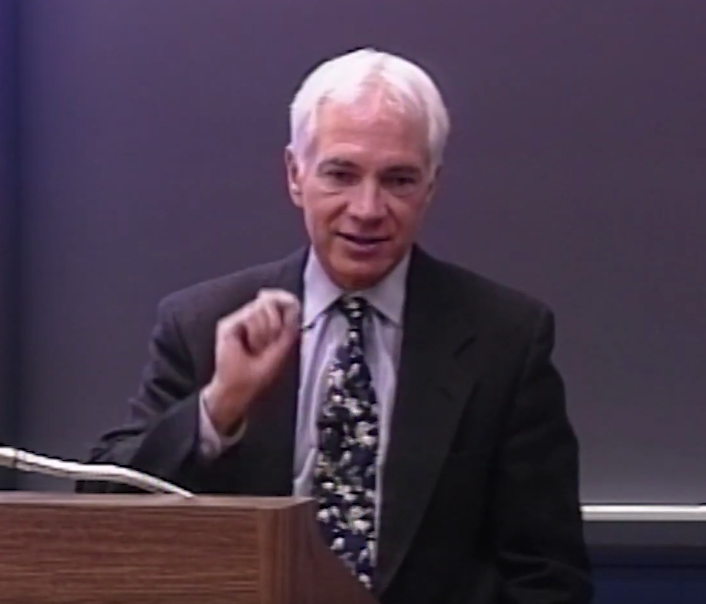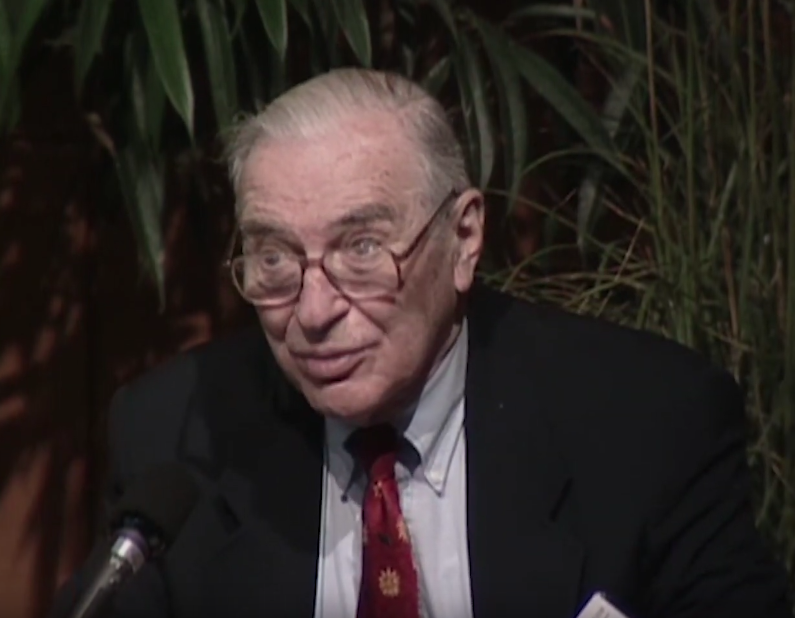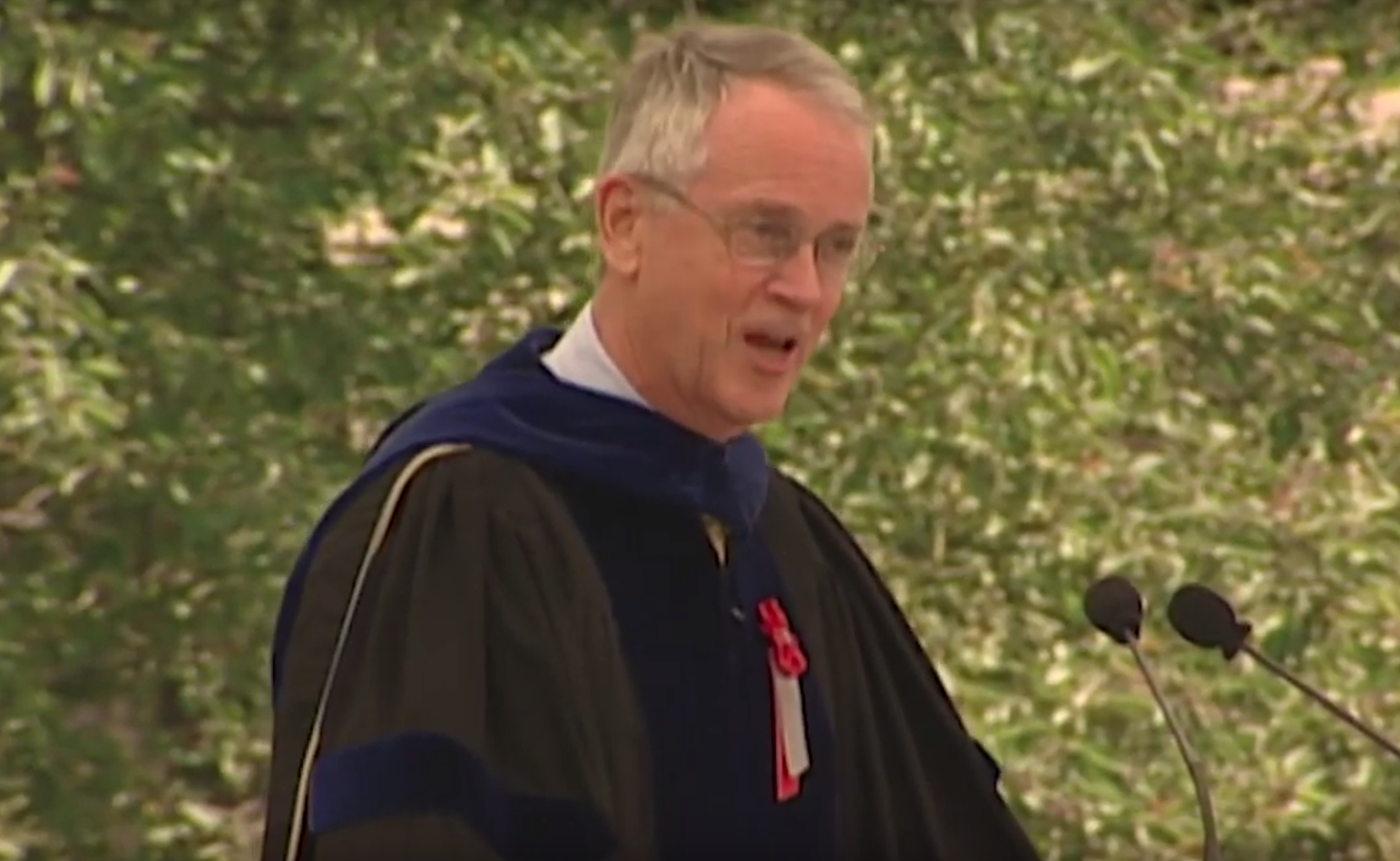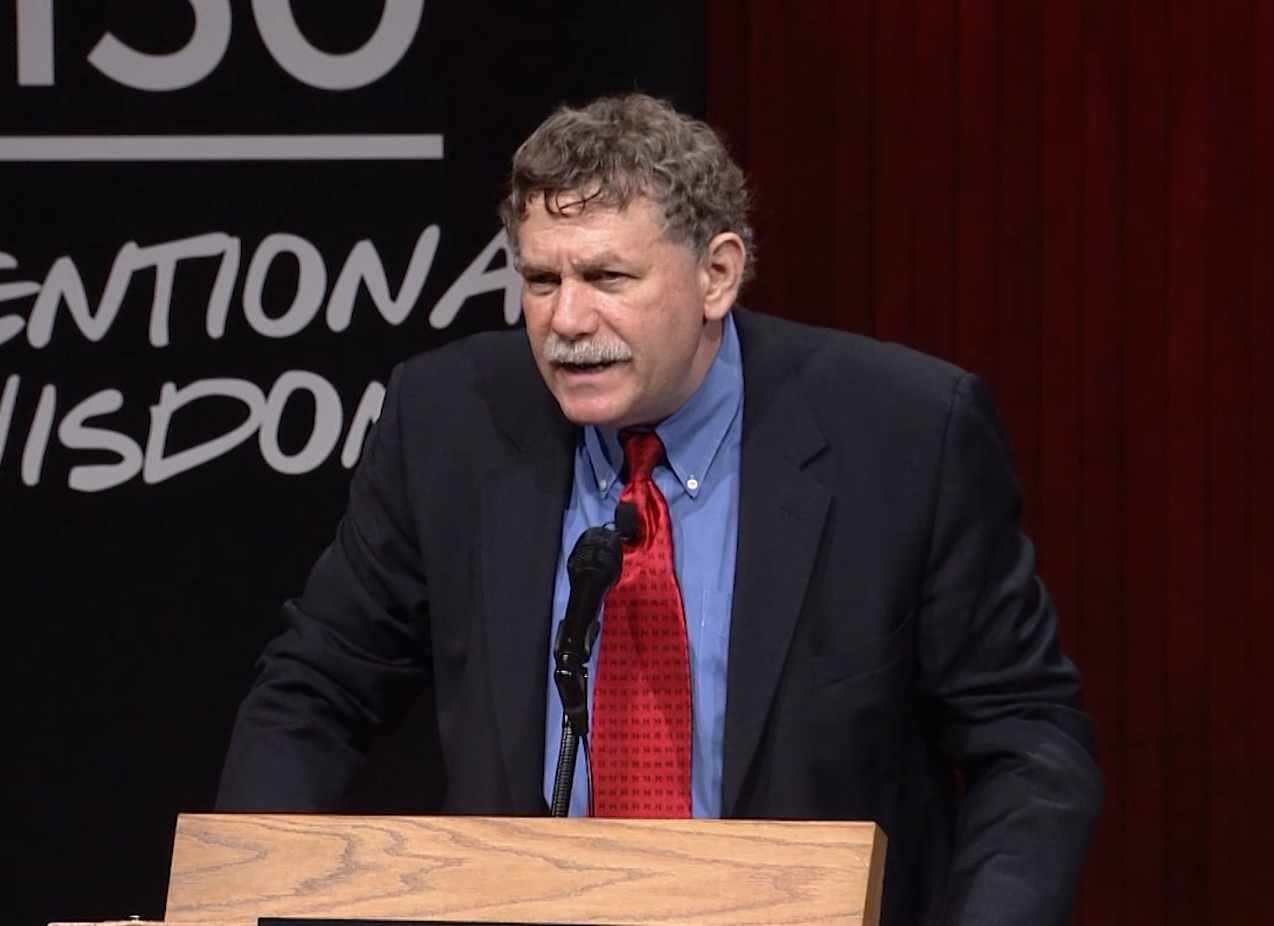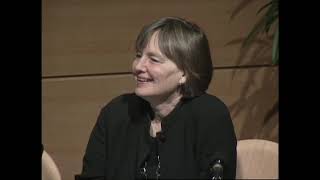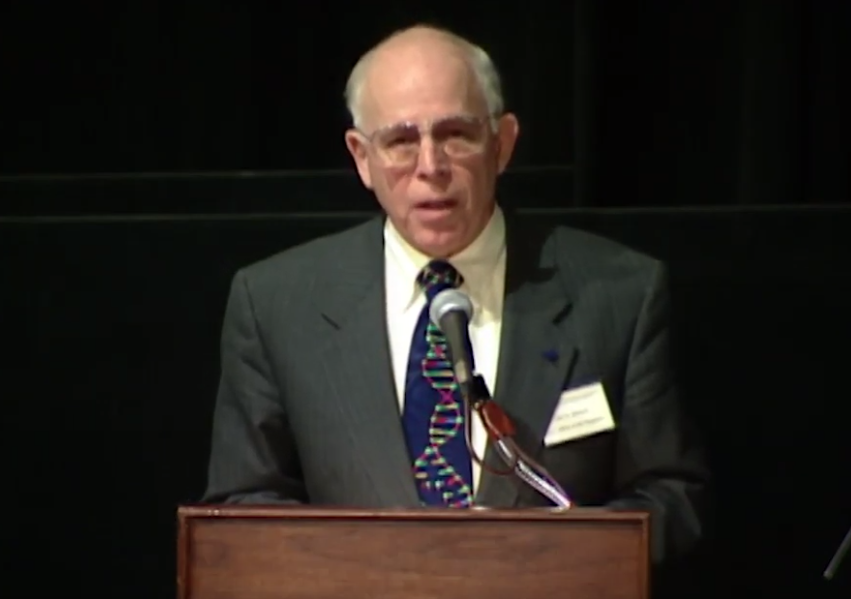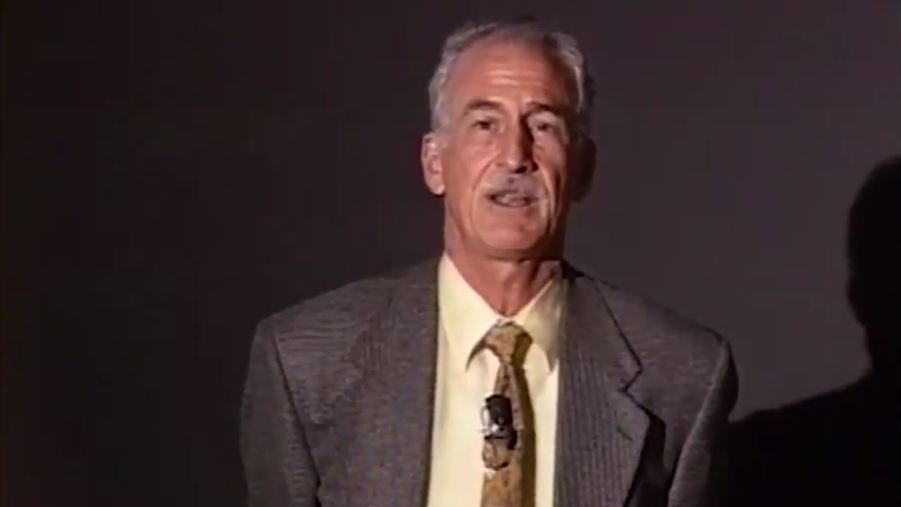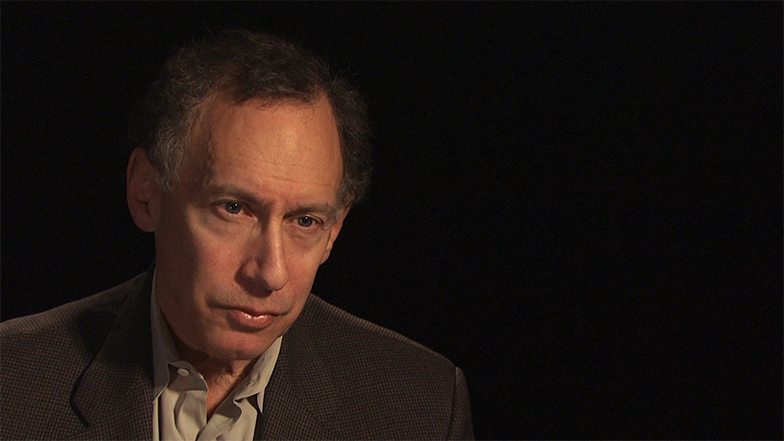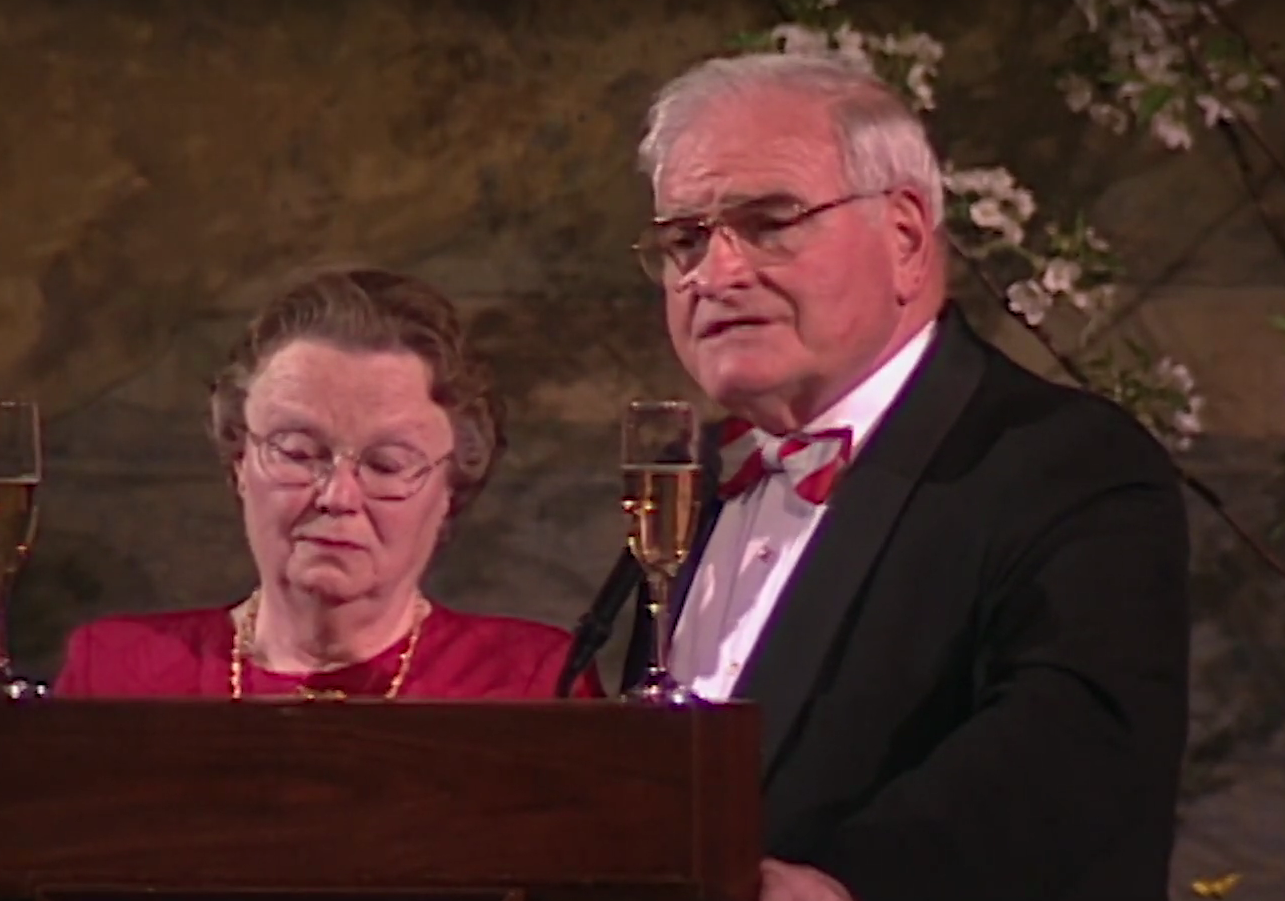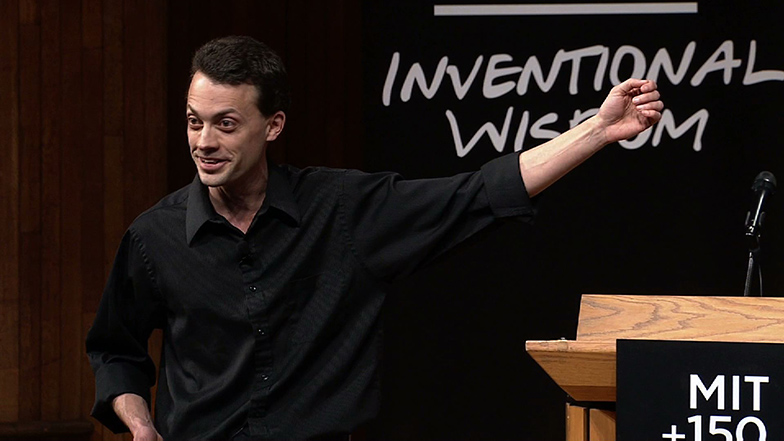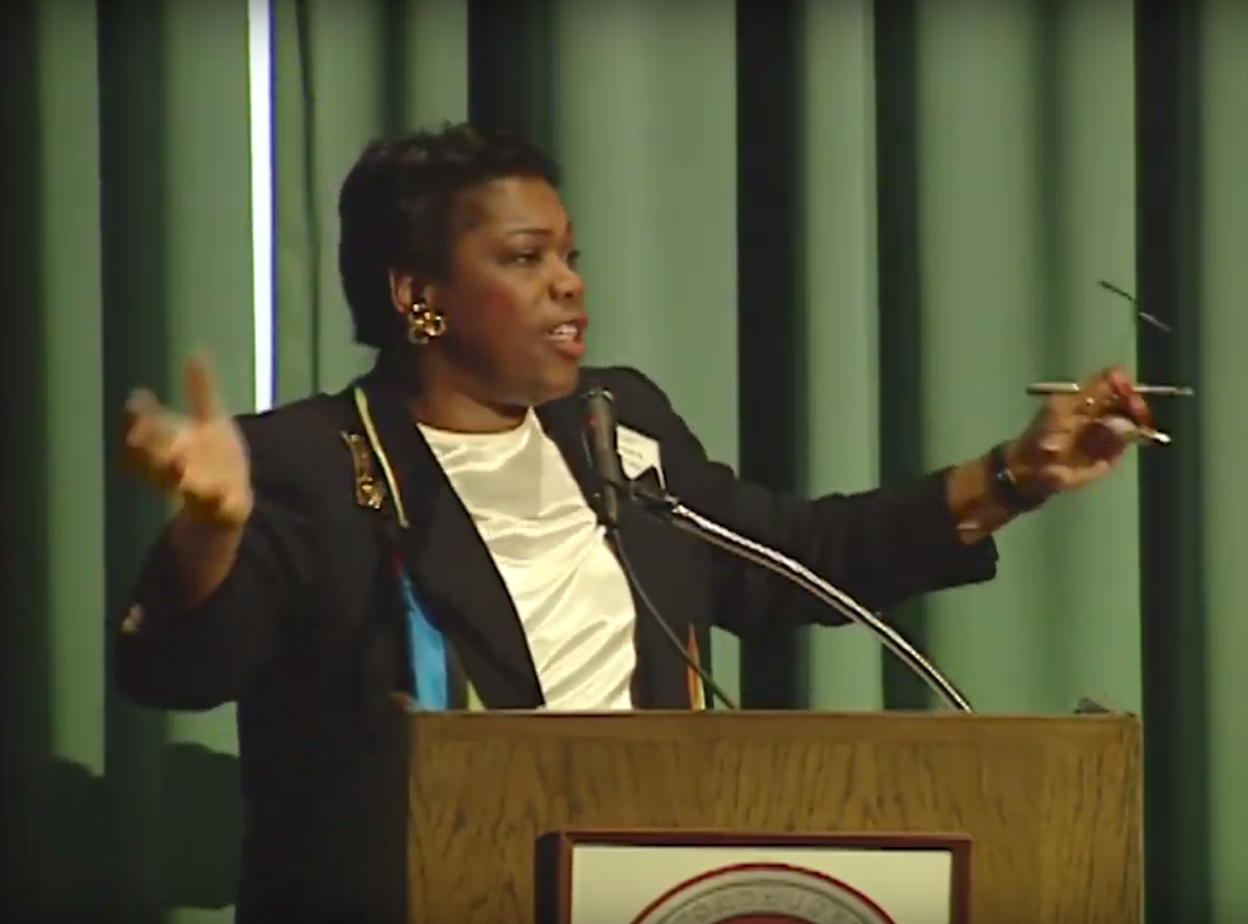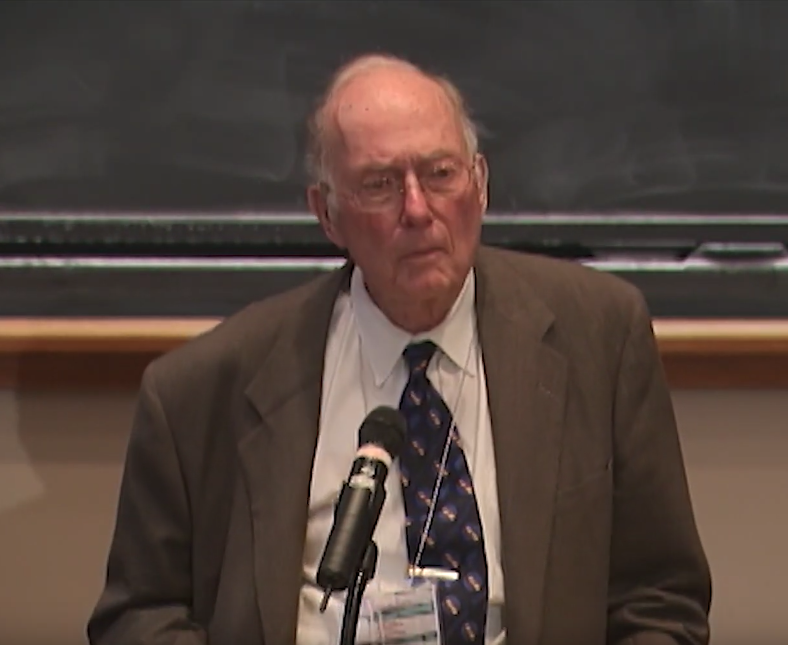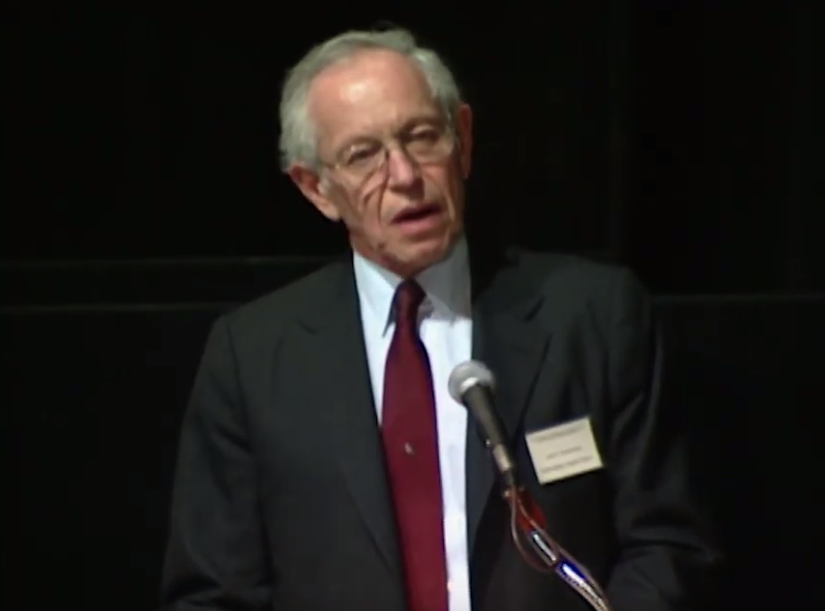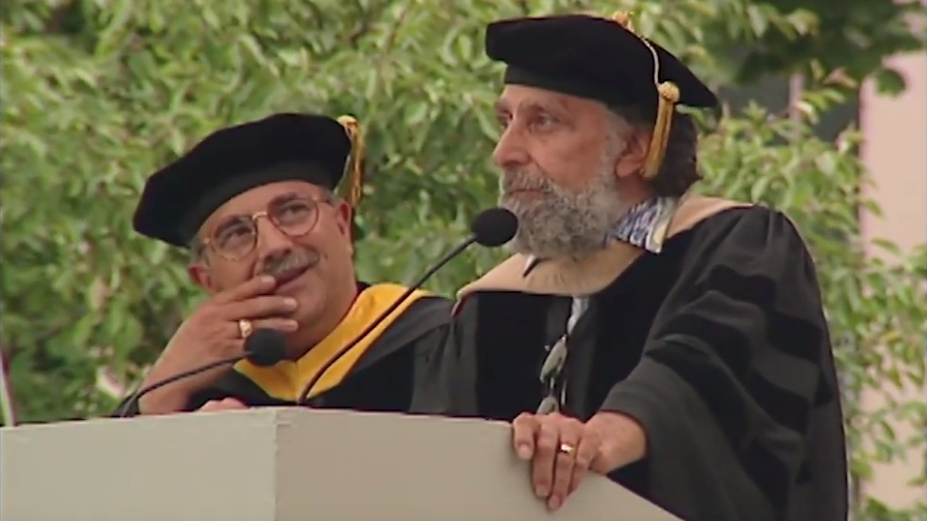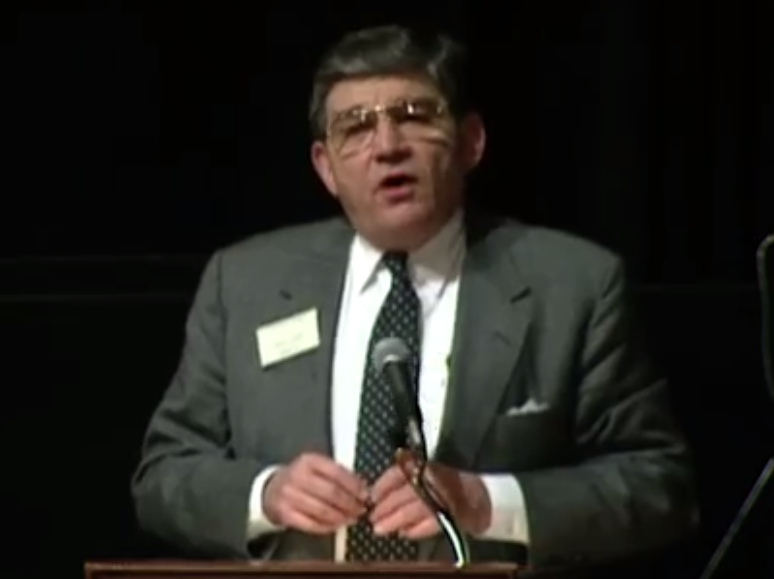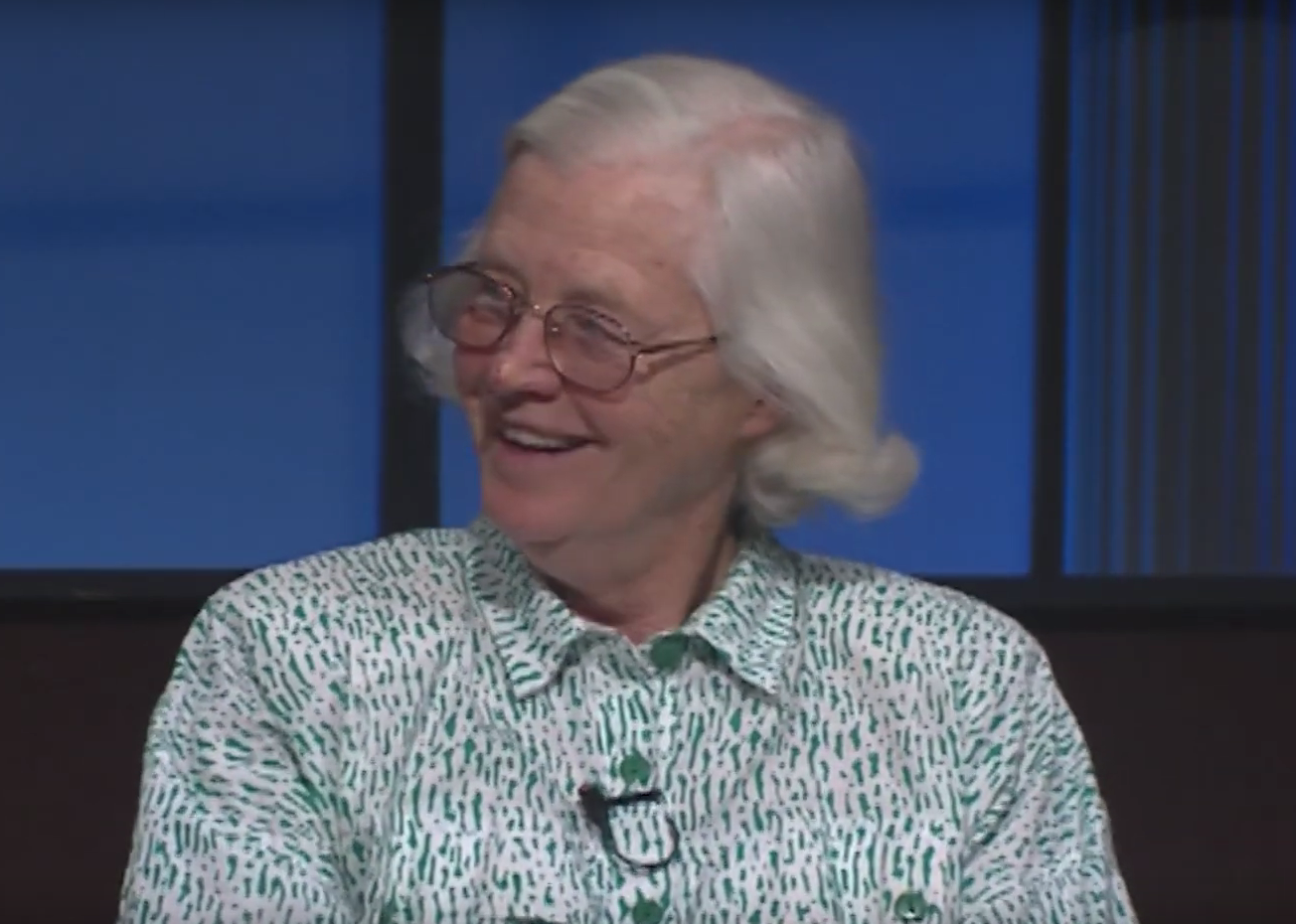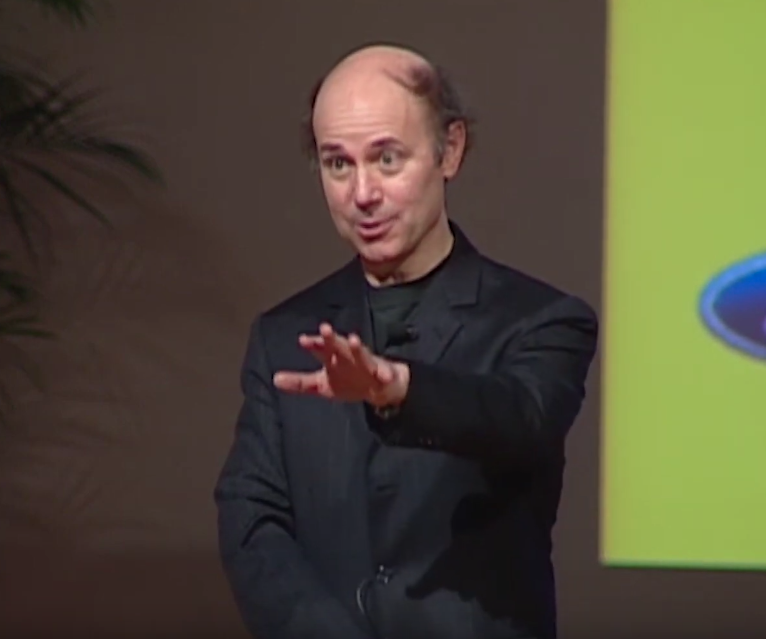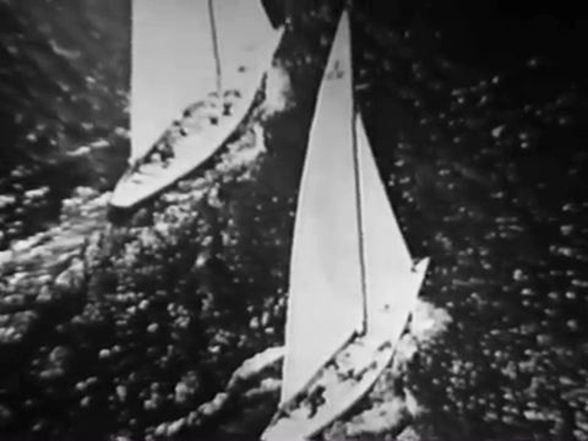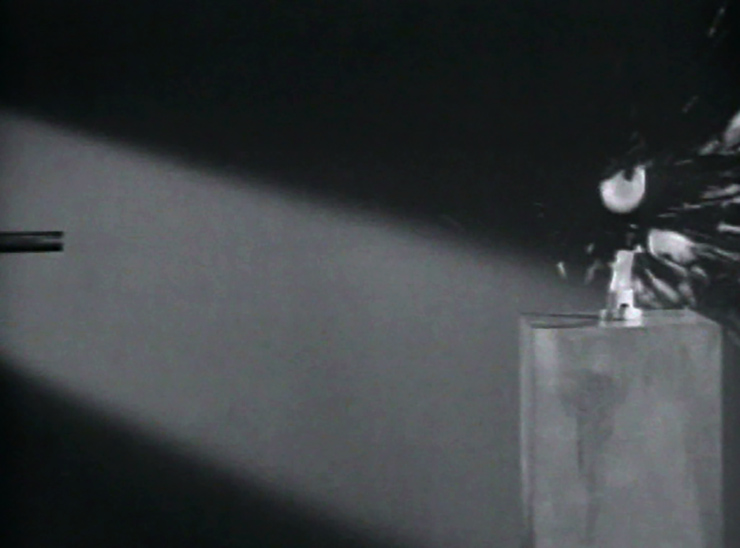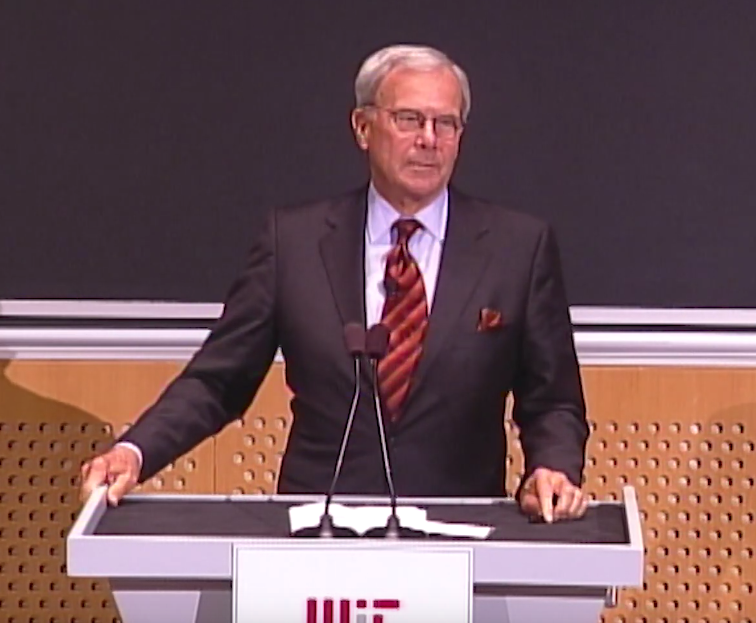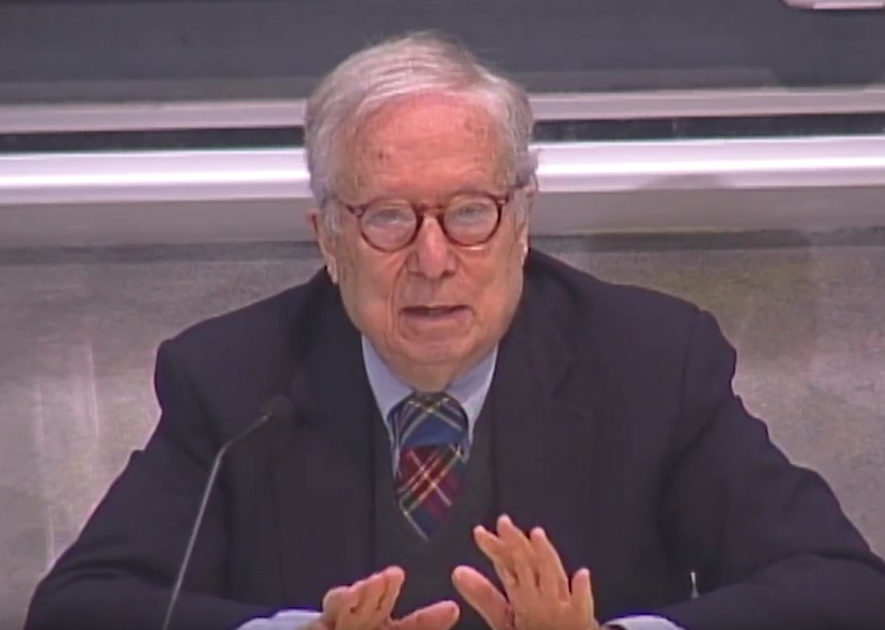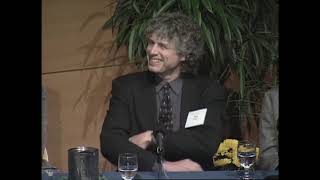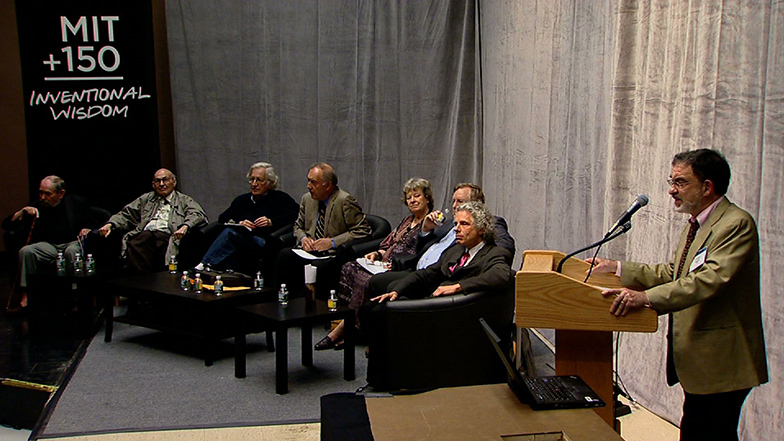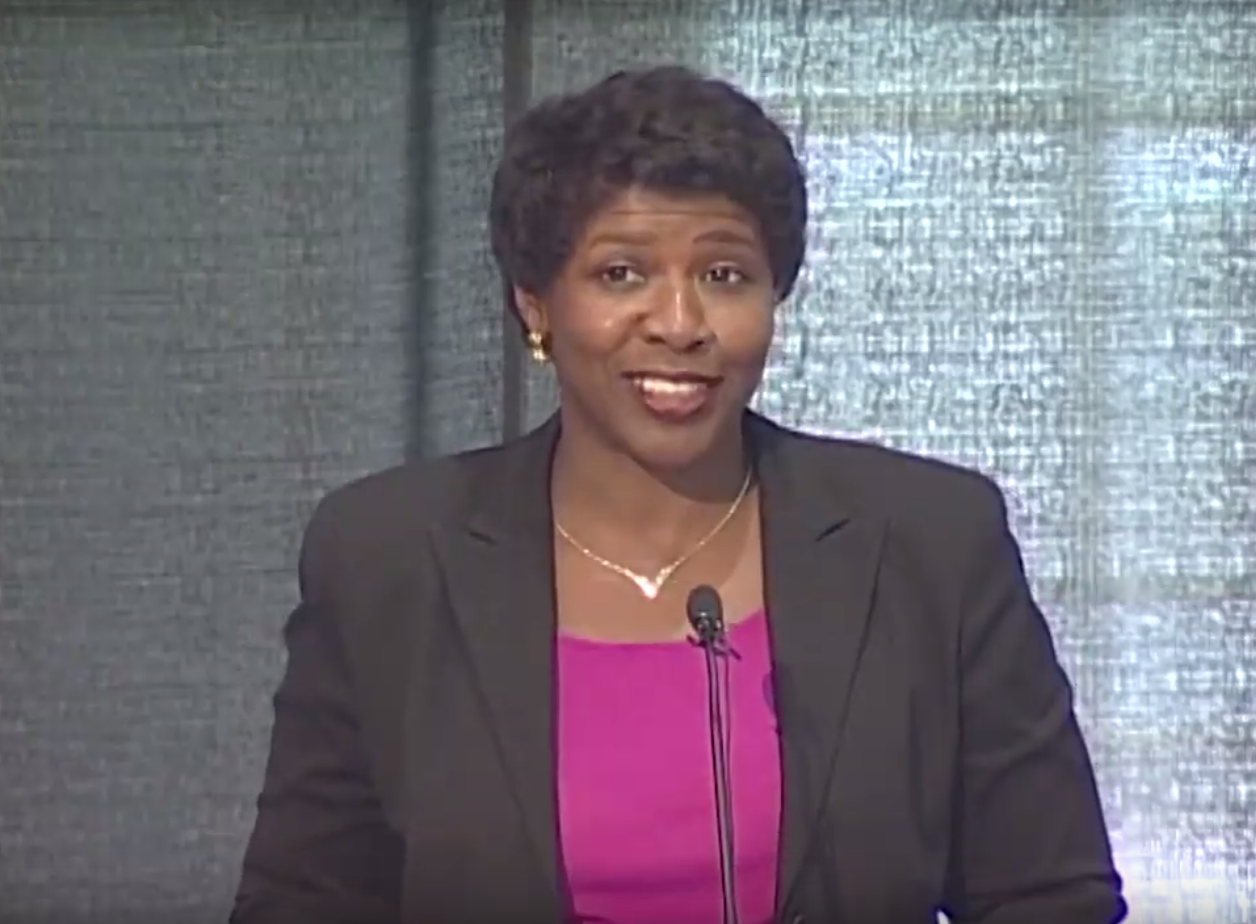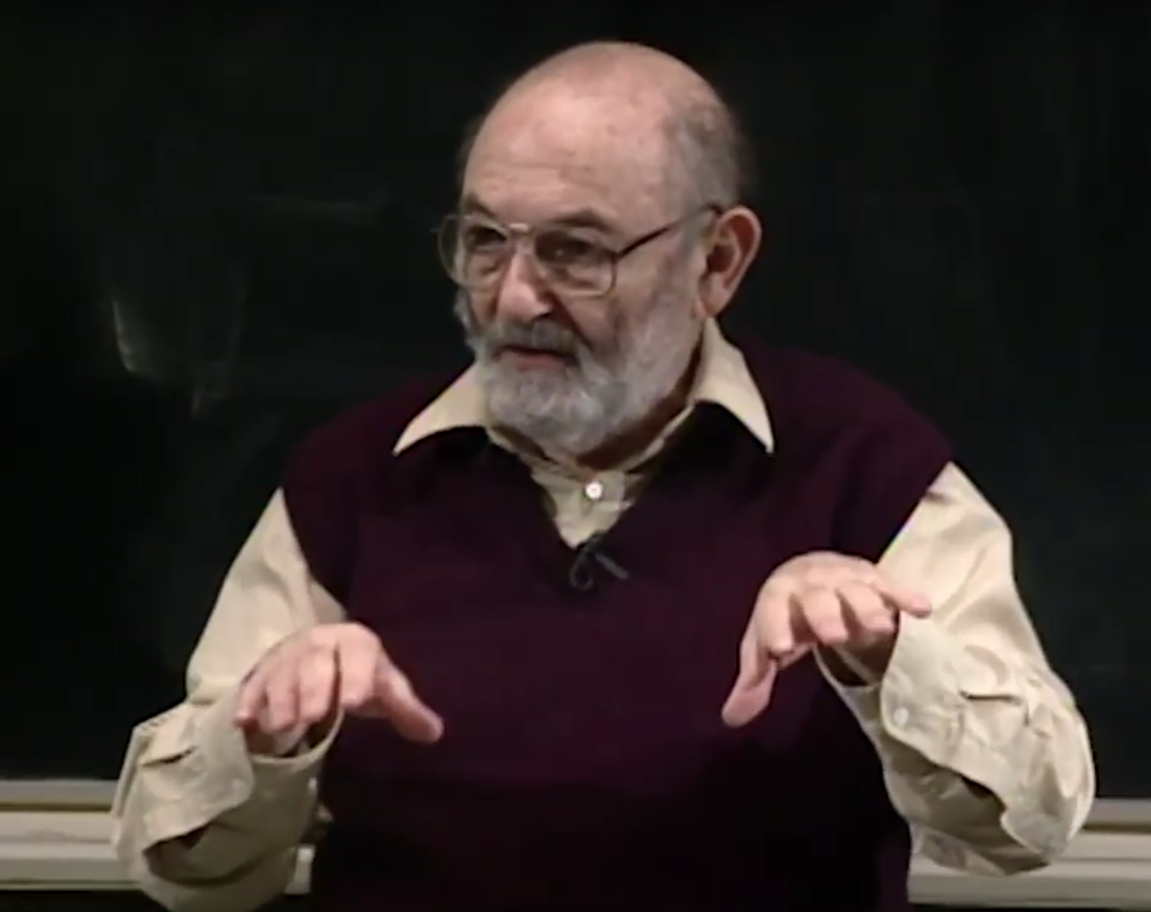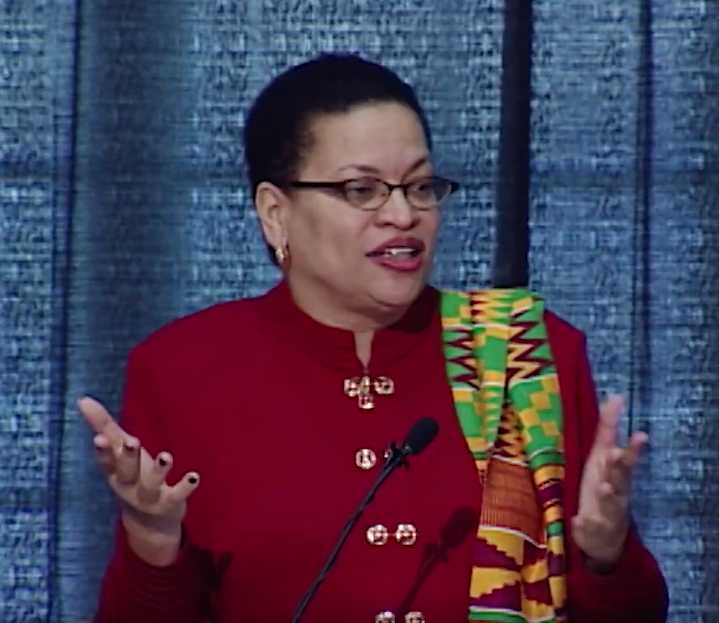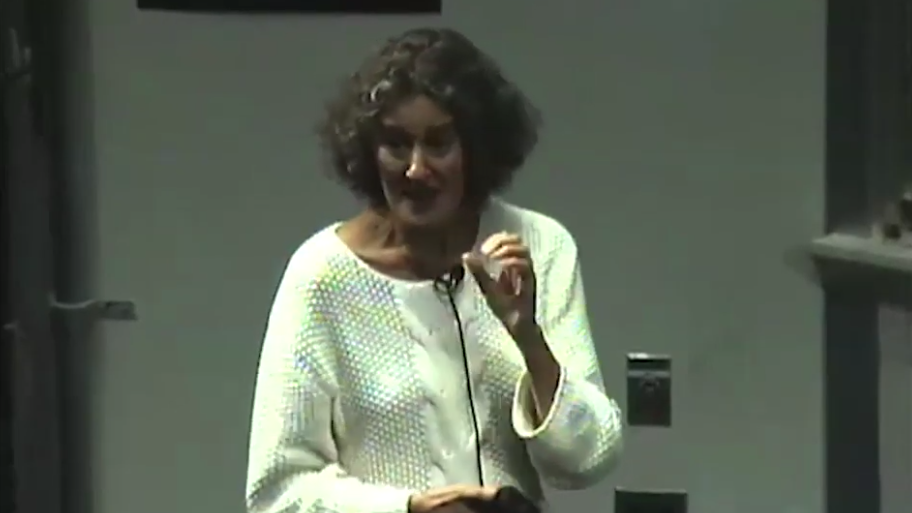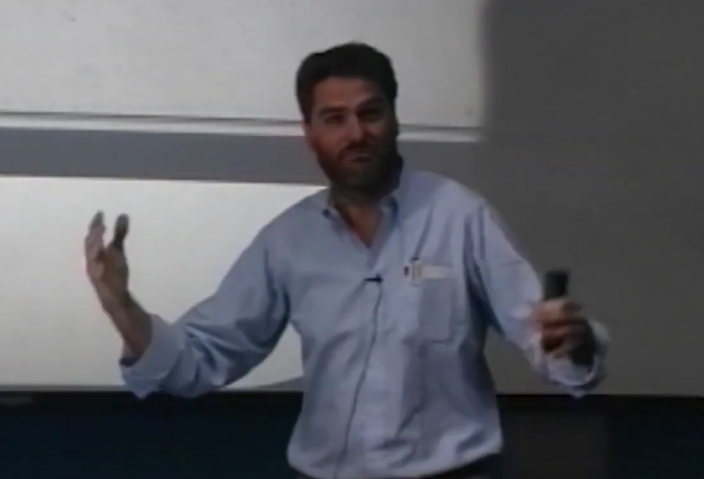Susan Hockfield
INTERVIEWER: You're the only person I can ask this question to. You are the president of the Institute at its 150th birthday. What kind of a milestone is that for you, and how does it underscore the importance of your job right now?
HOCKFIELD: Well, it's providing an opportunity for us to look back, as well look forward. And the reason I came to MIT -- I'm an outsider -- was because of the extraordinary contributions MIT has made to the nation and the world. It was a real call to service. This is just a moment when you can look back on what MIT has done, and really understand in a deep way its extraordinary role in framing up the 20th century and the 21st century.
So it's a really important moment for the Institute. It's a privilege to be president at the moment that we're celebrating the 150th. And I think it's a critical moments for our nation. I'd hoped we were going to position 150th around the opportunities that we have going forward that, frankly, we might be missing. We're at a different time in the nation from where we were 50 years ago.
I think that the opportunity to kind of think back at what we have accomplished over the last 50 years, because we marked our 100th anniversary, is really the story of the 20th century and the world, but really the story of America leading the world in the second half of the 20th century. And the lessons we can learn from that as far as going forward are going to be important, not just for MIT, but for the nation.
INTERVIEWER: How do you, as an administrator, as a leader at this institution, balance the need to understand the importance of your job, and the humility required to honor the legacy of an institution 150 years old -- balance those two to lead in a way to get something accomplished?
HOCKFIELD: That's a great question. You can't walk in the doors of the place, you can't look at the building without being consumed by humility. It is an astonishing place and it's filled with astonishing people. Its reach is astonishingly broad and important. So I think humility is a prerequisite for the job, and frankly, a prerequisite for being here.
One of the things that struck me when I first joined MIT was the surprising humility considering who I was talking to and what MIT has done. So there's a real sense of -- it's not false humility. I think it's a real sense of the magnitude of the challenges, the magnitude of the problems that we address, and how difficult it is to make any progress against them. So I think that's where the humility comes from. Also, just about anyone who walks down the halls of this place and talks to students or faculty or staff realizes how accomplished people are. So it's hard to feel that you yourself are accomplished when you're surrounded by people who are just quite remarkable.
Now, how we get things done is a really important question, and it's something that everyone wonders: how do you get anything done in a place where the premise is about individual achievement? We're an entrepreneurial culture. Universities are, by their nature, entrepreneurial about how you advance the frontiers of knowledge, how you advance your own frontiers of learning or knowing. So it's a very individual sport, in the sense. But what I always remind people when they ask me what it's like to be around the greats at MIT, assuming that that's an unpleasant or a difficult task, is if anyone on this campus imagined that they could accomplish what they want to accomplish on their own, they'd be working in their garage.
So people come here because they see the power in being part of this truly extraordinary community. My role is to harness those ambitions and recognize the synergies and create the opportunities for people that are greater than they might be able to create on their own. So for me, my job is facilitating what the community wants to do. That's where the initiatives of my presidency have come from -- they're all from the community. People imagine I brought the Energy Initiative to MIT. Nothing could be further from the truth.
I came to MIT and discovered an incredible passion, an interest in really making a difference in solving the world's energy challenge, and tremendous capabilities to do that. My job was to provide a structure through which people could exercise their ambitions and their dreams. I think that's the challenge of running -- any kind of organization that's based on individual enthusiasm, individual achievement, individual ambition.
INTERVIEWER: We're going to return to talk about the Energy Initiative. But it occurs to me to ask now just because what you just said. What's it like in that moment where you, as the president, says we can do this, we are going to do this, and then to watch it all begin to play out?
HOCKFIELD: Well it's utterly amazing. Because one of the things that I have insufficient imagination to do is to really understand what can be accomplished here. I have a rough idea, but in every case what gets done here, what people are able to think here, what people are able to dream here is invariably far beyond where my mind could get. Again, if I thought I could do this better on my own, I'd be doing it someplace else. It is very much a community activity. I describe the experience of being here and talking to any faculty member, any student, any conversation, as discovering myself in a future I had not yet imagined. That's the experience of saying, well you know you all say we'd like to do this, and if we did it this way, we could do more. And people saying well, sure we could. And then not just do more, do more and more and more, beyond what I certainly could have imagined when we launched.
INTERVIEWER: The story of your development as a scientist from the early days in your childhood, really, and sometimes it's the story of first seeing, and sometimes it's technology that enabled that seeing. Then the going from well, I can see the landscape, now I have to ask the right questions to figure out what's going on here. Is it sometimes that's what happened when you got your first microscope? You were able to see a world, and then as the fascination of just being able to see what you couldn't see before wore off, you began to formulate the questions, which resulted in the real science that you have been so privileged to do during your career?
HOCKFIELD: It's hard for me to describe what the motivation is that gets you to the place that no one's been before. That's the thrill of being a scientist-- is testing the boundaries. It's a little bit like poking on this wall and saying, is there really a wall here? And all of a sudden your hand going through and getting to someplace that you didn't know existed. I think the process of that is using a microscope or using whatever technology's at hand, because science is very often the story of new technologies. You know that quite well. It's really a discipline of your mind to take the things that you are seeing -- perhaps they're things that other people have seen also. And being able to recognize something that is non-standard. So one of the hardest things I think as a scientist is to see the glimmer of something new and not to dismiss it as just more of the same.
As I talk to scientists about how they do their work, that really is part of the, as I said, the discipline of the mind. It's why scientists, the caricature scientist is just a little off balance, right, or scholars are just a little off balance, because the ability to see things a little bit differently and push the technology a little bit further. I often say that 5 percent of science is seeing the glimmer so that you know that there's something new there. And 95 percent is stoking that glimmer till it gets to be bright enough for everyone to recognize that what you've seen is actually there. So it's 5 percent inspiration, 95 percent perspiration. The perspiration is the hard work to bring something that is just barely visible to you that you believe is there into visibility for others.
INTERVIEWER: You grew up in a family of girls, right?
HOCKFIELD: Yes.
INTERVIEWER: Three sisters.
HOCKFIELD: That's right.
INTERVIEWER: Your father an executive at General Electric.
HOCKFIELD: He started at General Electric. He had just come out of law school and he was a patent attorney at General Electric, and moved through corporate America. He ended up being general counsel and vice president for HowMet, but he started at GE.
INTERVIEWER: An exciting time to both grow up as a child in America, in terms of the development of science and technology and business, and an exciting time to be an executive, it seems to me. How did you experience that as a child growing up?
HOCKFIELD: You know it's interesting. I think we had a classic, kind of 1950s, 1960s family -- lots of activity in the home, lots of focus on the kids' education and music lessons and dance lessons and pursuing whatever our interests might be. I went to junior high school and high school in Chappaqua. My father worked in Manhattan, and he was gone for most of the day and came back and he focused on us. All the focus was on the kids, quite surprisingly. So we didn't know much about what he did.
When I was in elementary school, I would go to his office from time to time and I just sure couldn't figure out what he did. He sat at a desk I said, you play with paper clips? Yeah, I loved going to the office because there were all kinds of things to fiddle with. My father was an electrical engineer before he went to the war and came back and went to law school, and so he had a real sense of the same deep desire to understand how things worked. That certainly showed in how we understood things, the dinner conversations. What he did around the house, which was fixing things, building things, making things work and understanding how they worked to make them work better. So I think that's part of what infused at least my understanding of the fun there was in the world.
INTERVIEWER: For most people, I think there's a certain kind of bravery involved in having the wherewithal to take something apart and figure out how it works. That came to you naturally, it seems. Where did that come from and what are some stories of you taking things apart?
HOCKFIELD: Naturally, we often assume that everyone thinks the same way we do, right, and how could they not because this is our perspective, our point of view of the world. I don't know where it came from. I think probably the background was watching my father take things apart to fix them. So--
INTERVIEWER: Of course you could do it.
HOCKFIELD: --Of course you take things apart. Getting them back together was never necessarily part of the program. So I just would take almost anything apart. As I said, I didn't know that it was unusual. I kind of assumed -- I never looked to see whether other people were leaving this trail of bits and pieces of things they had taken apart behind them. Of course, most people don't do that.
But I was at a friend's house and I was fiddling with the door opener, this little device that prevents the door from slamming. She said, don't do that. I said why not? She said well, because you're always taking things apart and they never get back together. I had never even recognized that this was an unusual feature of the way my mind worked. The reason I was taking it apart because I wanted to understand how they worked. And isn't that what we all have to do? Well, we probably do all do that in some way, but not everyone does it physically.
I would say one other connection is my degrees in anatomy, and what anatomy allowed me to do was the same thing, was to take things apart, and to drive an understanding of function from structure. For students I always figure out what transformation makes things make sense to you. So for some people it's anatomy, for some people it's physiology, for some people it's biochemistry or molecular biology. There are transformations in the world that are quite intuitive, and for me, structure intuitively leads to function.
INTERVIEWER: For you then, is there a kind of universality to an inquiry into function in the sense that anatomy is the same as engineering is the same physiology is the same as chemistry?
HOCKFIELD: I think so.
INTERVIEWER: Really?
HOCKFIELD: I think so.
INTERVIEWER: That's a useful insight for a place like this, I would think.
HOCKFIELD: I think so. I think that one of the reasons that engineering doesn't feel alien to me, and this was quite a fear when I came in was that I wouldn't kind of get it about engineering, is that there are a lot of commonalities between how I decode the world and how engineers decode the world. They really do focus on putting things together though, where I focus on taking things apart.
INTERVIEWER: The other passionate story that comes out of your childhood is a fascination with how people come to be, how lives become the result of choices that people made. You discovered a particular experience in the library where you discovered biographies of people. And it wasn't particular people that fascinated you so much, but it could be set down as a story of oh, that's how that person got to be that person. Describe a little bit what it was you discovered and how important that was.
HOCKFIELD: Well, I think one of the things that was fascinating for me, I discovered this set of biographies when I must have been in third or fourth grade, at the most fifth grade. It was the same sense of we think of things/people as fully formed. But that you could understand the pieces of their lives that led them to the finished product that we view of something quite static. I guess you could say that it's the same kind of mental dissection that I would do of a watch or an iron or whatever object came my way, or the brain, when I started to do brain anatomy.
But I find some things absolutely fascinating. So, Barbara McClintock, who I had the extraordinary privilege to know when I was at Cold Spring Harbor Laboratory, viewed the world in a way that was different from anyone I had ever spoken with. In a way, frankly, I never understood. So it was infinitely fascinating for me to talk to her, because no matter what topic we would open, she would describe that topic in a way I had never heard before. In those descriptions I would learn things about it that, of course, I had never learned before because you've got to see the relationship between things to understand how it all fits together. I'm sorry -- I have to understand the relationship between things to understand how they come together.
The other piece of human interactions, that I only late in my life discovered was interesting, was how organizations can work. That's, of course, now the thing that probably fascinates me as much as anything.
INTERVIEWER: Part of the lesson from those biographies, it seems to me, was you understanding that people got that way because of choices they made, not because of some pre-ordained track that they were on. That involved some pretty important mentoring for you, going from someone who seemed to be interested in biology versus someone who decided to become a scientist. Can you describe where that transition was important in your early education?
HOCKFIELD: Yeah. And let me kind of rephrase it, because it's the choices are the second step. Making the choice is the second step. It's seeing that choices are available, seeing that there are choices to be made. Again, when I think about my role here at MIT, it's about opening opportunities, it's not about setting out the choices or making the choices for anybody. It's just increasing an awareness of the possible.
So, great mentors for me have been the people who have opened the window just a little wider so you can see possibilities that didn't exist before. You know it's important that people in your life, who you care about and respect, affirm that you can do something. But what I think is even more important are people who revealed a greater part of the world to you, so you know that there is another set of choices that you would never have imagined existed before. I think those are the really great mentors, the people who just kind of open your mind to possibilities that you didn't know existed and it gives you a kind of freedom that you didn't have.
INTERVIEWER: Do you recall anything about that first microscope that you received in, I guess, elementary school?
HOCKFIELD: Yeah, fifth grade. Christmas.
INTERVIEWER: First slide?
HOCKFIELD: I was just -- yeah, I mean just fantastic. So here's the thing about microscopes. You look at an object and you think you understand its structure. You put it under a microscope, and every little piece of it has an extraordinary structure within the structure that you can see. You can go through a light microscope, an electron microscope, all of the orders of physics. It's a big question in physics, what is the basic building block of the physical universe? It's a great question and how fantastic it is to, at every level of resolution, to see gorgeous structure, beautiful order unfolding. As deep as you can go it just gets more and more fantastic. So you don't really get to the end of it. It's an infinitely beautiful structure. Of course, it goes out on the large scale, also. But for me, I like the micro-scale rather than the mega-scale.
INTERVIEWER: Although in each case, higher resolution becomes better questions, and higher resolutions, better questions, and it's a sort of never ending process.
HOCKFIELD: Right.
INTERVIEWER: Do you remember the first slide you looked at?
HOCKFIELD: Yeah. The microscope came with a set of slides. It was a slide of some plankton. Magnificent colors. Bizarre Dr. Seussian kind of structure. Wonderful things. I just remember taking it out of the microscope, once I looked with the microscope, and holding it up, and trying to, in my mind, understand how the thing that I was looking at without magnification became the next level of resolution structure. Very exciting.
INTERVIEWER: Same thing.
HOCKFIELD: Real exciting. I mean intoxicating for me, absolutely intoxicating.
INTERVIEWER: Your undergraduate education was University of Rochester?
HOCKFIELD: Yes.
INTERVIEWER: Why did you decide to go there?
HOCKFIELD: Why I decided to go there. It was there. Who knows? It just ended up that I was there. Not so much from choice as just college counselors said apply to these schools, and I applied to these schools. I got into Rochester, I got in some other places. I don't remember where else. And Rochester was the place I went. I was in college from 1969 to 1973. A very difficult time to be in college as it is to be in college at MIT today, or in college anywhere in America today. It was a time of enormous social upheaval, political unrest, and for people whose interests were in those things, an interesting time. But from my perspective a very distracting time. And a time that certainly brought many things good to the country, but a time of just profound, what I call, dislocation. So, a difficult time to focus on your studies, if your studies were not politics.
INTERVIEWER: Did you find a frustration with the ways in which people were working out their political anxieties versus the sense of pragmatism and an inquiry into the nature of things that is sort of sort at the center of your heart?
HOCKFIELD: I sure wish I understood things as well then as I do now. I think you just articulated better than I ever have what the conflict was for me in college. It ended up that my discovery of the thing that really made my heart sing happened after I left college, even though the glimmer was there. What I hope for every student who comes to MIT is that each of them discovers the thing that really makes his or her heart sing while they're here. Happily, I was led to the thing that made my heart sing through my experience at Rochester, but it was not in studying that I discovered it.
But I had a faculty member who I went to see after class one day -- great class. Again, so finally close to the end of my time at Rochester, I had a class in cell biology, which was a field that was just exploding in late '60s, early '70s, largely through electron microscope and other new technologies. In talking with him about a problem he had posed in class, I happened to reveal my own conflict that I didn't think medical school was the right direction for me and I didn't know what I was going to do. He looked at me, said you should get a job in a lab. And it's one of these things, yet another -- and the door opened.
INTERVIEWER: But didn't you also suggest the solution to the very problem he had posed?
HOCKFIELD: I did.
INTERVIEWER: You're burying the headline there. HOCKFIELD: That was easy. I brought that into the office. What I left the office with was a path to my future.
INTERVIEWER: And his response to your saying, well I bet you could probably solve this problem if you looked at it this way, was what?
HOCKFIELD: Well, why don't you do that? I said, how could I do that? He said, you do that work in a lab.
INTERVIEWER: Now was your question, how can I do that, in any way influenced by a sense that there were limits for women in science, a sense that you we're supposed to go to med school, a sense that I wasn't a scientist because I haven't got a science card in my wallet. What were the limitations?
HOCKFIELD: It was not knowing that there was a path. Not knowing that there was a world of being a scientist, even though I knew scientists. My parents had some friends who were scientists, but I didn't understand what it was they did. And I couldn't connect the thing, that glimmer of something that I loved with what they were doing.
So I just didn't understand, and this professor, Professor Kay, took these various disconnected pieces of my experience and put them together in a way that made sense. So it wasn't -- I didn't feel as though there were artificial barriers or boundaries. I just didn't know. And that's this whole theme of opening a possibility, revealing possibility where you didn't know there was anything there. It was creating something out of nothing, right?
INTERVIEWER: And also going from passive to active.
HOCKFIELD: Yes.
INTERVIEWER: Life becomes a biography in that moment. Oh, that's how science happens.
HOCKFIELD: Yes.
INTERVIEWER: It seems like a pretty extraordinary insight, even though you seem to describe it as having come relatively late. It's a great insight that seems to have been relevant all throughout your career.
HOCKFIELD: Oh, it was a moment that changed my life, but also a moment that allowed me to understand the world and people in a completely new way. Completely new way.
INTERVIEWER: What a gift.
HOCKFIELD: Yeah. Extraordinary. Lucky. Lucky. So I described the thing about finding the thing that made my heart sing. I kind of assume everyone would do that. I wish everyone could do that. I wish everyone could be so fortunate as to find the thing that makes your heart sing and then be able to actually run with it. It's hugely fortunate.
INTERVIEWER: And a mission that you, I think, think of as part of your presidency here.
HOCKFIELD: Oh, absolutely. Absolutely. So what you'll get to at some point I know is becoming dean of the graduate school, at Yale.
INTERVIEWER: Yeah, we'll go there in a moment.
So, describe your first experiences with an electron microscope.
HOCKFIELD: So when you see a structure and you think that if you expand it 100-fold. So if you look at the distance between the table and the chair here, and if you were to blow it up, it's still going to be space, right? Well, that's not actually true, because when you blow it up and you can actually see the details of the structure that's there. It's incredibly exciting to actually see how those structures are built, the structures that you can see with the naked eye or with the microscope. So for me the electron microscope was just exciting doesn't begin to describe it. Breathtaking. Just breathtaking.
Let's see, I got into the lab in 1973, in the spring semester of '73. I had been studying electron microscopy in a book, right, in a class. Completely different to actually get in there and drive the microscope yourself. The electron microscope is a bizarre instrument because -- I haven't been in an electron microscope in years, so probably you don't do this anymore. But at the time when I used one you sit in a completely darkened room and stare at the little fluorescent screen that fluoresced with the image of these electrons hitting it.
So it was all kind of spooky. It was like being in a submarine or something. You had these controls and you're staring through a little port because it was all under a huge vacuum. So it was all a little strange, but allows you to focus completely. No distractions outside of this screen where you were looking at the specimen you were examining.
INTERVIEWER: Your graduate school experience, it seems to me, is about this transition from knowing science to doing science. Describe what that was like as you went to Georgetown and had the experience of the NIH.
HOCKFIELD: So, I was, again, enormously fortunate because I worked in a lab. I was a lab tech for two years doing electron microscopy and learning how to do science, learning the practical things of how to do science, learning how to read the literature, learning how to develop a protocol for a set of experiments. I just got practical training.
Then when I went to graduate school, the transition was from taking the practical training, doing someone else's experiments, to the next step of figuring out a problem with the help of an advisor. I think this is very important. It's a magnificent relationship. People often stereotype this in ways that I think are quite unfair. Then building the structure that allows you to go after a particular question, a particular problem.
So, to move from being a technician to being a key member of the intellectual team that frames the problem -- framing a problem is very difficult -- and then devising the method to solve it. Easy enough to say, but that's just trial and error. I mean it's not just trial and error, it's informed trial and error, but it's doing an experiment 10 times before it works once. Advancing the knowledge step by step and doing that in conversation with other people, again, wonderful, just wonderful. I was very fortunate because before the end of my first semester at Georgetown, I got a job in a lab at NIH, and so my dissertation work was all done at the National Institute of Health in a group where they had never had a graduate student before. So lucky me, I was treated like a postdoc, so I kind of got elevated.
INTERVIEWER: Why was that though? I mean the reason that was the case had to do with the nature of your advisor.
HOCKFIELD: It had to do with the nature of my advisor -- a wonderful man, Steve Gobel. It also had to do with the fact that I had already done the boot camp. So I had already learned how to work in a lab. I had already learned how to handle chemicals and scales and all the machinery that you need to do. I wasn't making a mess. So I was value-added for them. Well, I just attribute it to my technical skills. Now think back, it was value-added in terms of my intellectual skills as well. It was incredibly exciting. My advisor had never had a graduate student before. He only had a couple of postdocs. So he didn't know he was supposed to treat me differently from a colleague. So it was perfect time for me in terms of the development of my technical/intellectual abilities. And very exciting because of what the lab was doing.
So, perhaps if I had done my dissertation work in a laboratory at Georgetown, my guess is it would have been more strictly disciplinary. But I was with a group, a pain research group. A pain research group. Not the neuroanatomy group. I was with the pain research group at the NIH. So, there were anatomists, my advisor was an anatomist. There were physiologists, there were clinicians, there were biochemists, there were pharmacologists. It was this crazy mix of people all studying pain with the idea if we understood how the brain processes pain, we can understand how to alleviate it.
This is how I grew up. This is my critical period for doing science. So this is where I came to just assume that science is done in a cross-disciplinary way. That anatomists by themselves can't solve the problems, you need to talk to the pharmacologists and the physiologists and the clinicians. In retrospect, that was an incredibly important experience as a graduate student to be in a mix of people bringing different perspectives, different technologies to a particular task, a particular problem.
INTERVIEWER: It also seems to be a very important experience for a future administrator to see how the quality of the research is dependent upon the vision to get the right people together. Perhaps you didn't recognize it at the time, but is that experience at NIH an important model for the administration of large-scale research?
HOCKFIELD: Yes. But I would, again, turn it just a little bit on its head.
INTERVIEWER: Please.
HOCKFIELD: It's about creating opportunity. It's not going out and picking you, you, and you. I mean I pick my dream team in terms of the people I work with. But I work in a particular way, and so not everyone wants to work with me. And not everyone wants to be at MIT. Not everyone wants to think outside their disciplines. So, it creates an opportunity for a certain kind of person, a certain kind of work. So what control do I have over it? I have creating opportunity, creating personality, creating a kind of culture that attracts a certain kind of person. Not to say that I'm going out and saying I'm going to choose you, you, and you because you fit.
One of the great compliments I got, and I was puzzled by it when I was putting together my senior team. Someone said, oh I get it, everyone you've hired is the same. I was thinking how could they be the same? They're all fantastically different. But they are the same in a certain attitude, a certain perspective on the world. But they're as different as can be because they have to do very different jobs.
INTERVIEWER: So, in an early stage as a graduate student, you discover the value of interdisciplinary research. It sounds to me like you're saying there that that's been a difficult -- as intuitive as that was for you as a graduate student -- that's been a difficult model to apply broadly, given the way science is done in the United States. True?
HOCKFIELD: Yes. Yes. It's hard. I'm a zealot about this. It is a very important way to make progress. I'm not going to say it's the only way to make progress because there are great discoveries and great advances that come out of more narrowly defined activities. But for me, and for a certain kind of person, progress can be made at an extraordinary pace by taking down the walls between disciplines.
INTERVIEWER: We'll come back to this as we talk about your experience here. Let's get you to Yale. The experience at Georgetown it seems to me allowed you to fall in love with the discovery of the outer reaches of science, but also to fall in love with the brain in a certain sense. Give us a sense of your discovery both at Georgetown and then on at Yale, that study of the brain was to be what you would do.
HOCKFIELD: Yes. I finished Rochester a semester early, and the job that I took at the University of Rochester Medical School was in an neuroanatomy lab. So I got into the brain fairly fast. It wasn't by choice. It wasn't choosing neuroscience, it was choosing electron microscopy that got me into the brain. It's great to like to be a neuroscientist, and I often say it's great because you can think about the enormous questions for mankind, philosophical and psychological questions, but still be grounded in something that really is quite rational, quite provable, quite scientific. I think that's probably what kept me in brain research rather than moving to another area.
The opportunities are enormous, and I think it's just the ability to explore the unknown is great in neuroscience, the rate of change in neuroscience research. So I graduated in 1979. You know those last two decades of the 20th century, the amount of neuroscience knowledge that we gained in those 20 years probably was easily equivalent to the 100 years before. So the technologies became sufficiently sophisticated. A lot of technologies became sufficiently sophisticated to allow us to explore the brain.
So it's been exciting to be part of a discipline -- it's not a discipline, it's a set of disciplines where the progress is staggering. You know, fields wax and wane in terms of coming up with really transformational ideas, and I guess wherever people are doing research you're making progress. But I think the thing that was particular with neuroscience is that it seemed like every six months or so you'd just kind of throw away all that stuff that people believe, and say, well that's not true because the paradigm was changed. So this idea of a Kuhnian view that you do standard science, which can progress quite rapidly, but it's the paradigm- shifting science that is breathtaking. That seems to be happening at -- not seems to be -- that happened at an extraordinary rate.
INTERVIEWER: And you were seeing that and had the excitement of that at Georgetown and when you moved onto Yale.
HOCKFIELD: Yes. So, at Georgetown I postdocted at UC San Francisco for a year. Again, a lot of people just kind of opening up new avenues of inquiry in neuroscience. Then I was at the Cold Spring Harbor Laboratory for five years, and that was an enormously important period for me. I was educated as an neuroanatomist, and Cold Spring Harbor was about molecular biology. I had not, for neuroscience there wasn't any reason to pay attention to molecular biology because it wasn't relevant. Yet, it became relevant in the late '70s.
The Cold Spring Harbor Symposium on quantitative biology in 1980 was on the brain. I think many people would mark that as when the starting gun went off for molecular biology. So I had the opportunity to learn molecular biology while doing neuroscience at Cold Spring Harbor. It was an important time for neuroscience and really exciting for me to be a participant.
INTERVIEWER: Recall the invitation to Cold Spring and how that came about.
HOCKFIELD: I had not yet finished my first year of postdoc and I went to Cold Spring Harbor to participate in a workshop. Cold Spring Harbor does a lot of these postgraduate activities to help people get up to the state-of-the-art. So I went to be part of a pain workshop to talk about and think about new ways to approach pain research. Two scientists at Cold Spring Harbor had just made some monoclonal antibodies that recognized cells in the nervous system of the leech. I was talking to one of these scientists and she showed me these photographs of leech nervous system stained with monoclonal antibodies. So lighting up the nervous system in extraordinary ways. I, again, remember viscerally, the feeling, as she went through these photographs, of being mesmerized. Mesmerized.
So if you look at the nervous system of any organism -- a human, a rat, a mouse, a leech -- you can't see very much. The same thing about it all looks kind of the same. It looks like a piece of manila folder. It doesn't have much natural anatomy to it, much natural structure to it. But if you put it under a microscope, there's incredibly beautiful structure. And one of the questions is how do you determine what pieces of this thing are doing what jobs?
So what these antibodies allowed you to do was pull out particular cells and particular pathways in ways we hadn't seen before. Basically, if there's a biochemical difference, it means there's going to be a functional difference too. So it provided a way to really start dissecting the brain in a new way.
INTERVIEWER: And just to make a point, up to that time, the techniques for putting brain tissue with function were incredibly crude. This got you down to the cellular level.
HOCKFIELD: Yeah.
INTERVIEWER: You could put an electrode here and see what moved. But suddenly we're at a point where you can actually theorize about individual cells or groups of cells.
HOCKFIELD: Yes. [INAUDIBLE] groups of cells. It's groups of cells, because Ramon y Cajal in the 19th century figured out how to stain the brain so one cell would get stained and you could actually see that a nerve cell was this incredibly complex cell. But that cell wasn't attached to the next cell in the pathway, it was just that cell by itself. And you didn't how many of those cells there were, if that was just a single cell or it was surrounded by 10 cells like it. So it allowed you to look at categories of cells. So it really put together functional networks, was the idea.
So as an anatomist I looked at these pictures and said wow, that's weird. This particular antibody stains six cells, these six cells. And this antibody stains four cells and they overlap with these six cells. What's different? Well, what is it seeing the cell membrane? Is that what is different? Is it seeing some internal structure in these cells? What is different between these two things? So that's a question that electron microscope can solve.
So on the side, while I was doing this pain workshop, I was doing my neuroanatomy on these leech antibodies. At the end of the three weeks, I was asked if I might consider joining Cold Spring Harbor.
INTERVIEWER: This was like a memo that came in your inbox.
HOCKFIELD: Like someone came up to me and said would you think about coming here?
INTERVIEWER: Who was that?
HOCKFIELD: I think it was one of these two scientists who had done this incredible monoclonal antibody study. I said, well, I don't know. I said, well sure. I'm not sure exactly what happened, but I didn't think very far down the pike. It was the opportunity to work on these antibodies was really -- I couldn't not do it. In any case, she said well I had to come back and talk to Jim Watson. I said well, sure.
So they went to visit some friends in Washington and drove back and talked to Jim Watson and he offered me a job.
INTERVIEWER: What was the pitch from Professor Watson, Dr. Watson?
HOCKFIELD: The pitch. It's very interesting. It wasn't a sense there was a pitch, there was a conversation about antibodies. We talked about the antibodies and I talked about what I had seen and what I thought could be done. He talked about his sense of neuroscience being a very important area of research for the lab. It was all really quite informal.
INTERVIEWER: The sense of mentoring wasn't so much of an issue as the idea that you were a part of this movement.
HOCKFIELD: That's right. He was an extraordinary mentor. Just an extraordinary mentor, and it's by virtue of these conversations. Mentors are thought partners. And as thought partners, they're door openers or window openers. When I have done what is called mentoring students or postdocs or colleagues, it's about a conversation about their hopes and dreams, and it has to be something that I'm excited about too. Through that conversation, I don't know in advance what I'm going to advise, but it's through conversation that opportunities are revealed that people can take that they didn't know and I didn't know existed before we had the conversation often. This is part of Jim Watson's genius.
INTERVIEWER: What kind of environment was Cold Spring Harbor for you?
HOCKFIELD: It was very intense. I mark it as the first really high-powered intellectual environment in which I allowed myself to participate, I guess. It's a very intense and wonderful place. In many ways it's like MIT. It's people racing to invent the future in a nonstop way. The thing that binds you at Cold Spring Harbor is your own mind. So as fast as you can think, as well as can think, the resources are there to put those thoughts into action. For me that is the ideal educational research environment. You want the thing that limits people's advance to be their minds and not the physical resources, not the state of the labs, or the ability to muster the resources to get an experiment done.
INTERVIEWER: You've described that part of the excitement of neuroscience is the scope of it in the sense that you can inquire about philosophical questions, perceptual questions, chemical questions, biological questions, physical questions simultaneously. In that sense is a liberal institution like Yale an ideal place for a Susan Hockfield at this stage of her research?
HOCKFIELD: Oh, it was outstanding for me to move from Cold Spring Harbor to Yale. Again, perfect timing. I had learned a considerable amount of molecular biology, had put together a technical toolkit and an intellectual toolkit to pursue the science. There weren't many neuroscientists at Cold Spring Harbor, which allowed me the luxury of focusing on molecular biology, and being then ready to apply these tools to neuroscience questions. It was marvelous to move to an environment where -- I don't remember if there were 85, 90 neuroscientists at Yale. It was a terrific neuroscience community. To bring this new perspective that I gained from being at Cold Spring Harbor to a community of neuroscientists and the greater liberal arts -- philosophers, psychologists, chemists. It was, again, very exciting, very productive place to be.
INTERVIEWER: It's really to draw an arc from the great conversations around your dinner table as you were growing up in Chappaqua and other places, but as a pretty much as a nomad as a child because your Dad moved around a lot. To the community of Yale, which is very much a warm community within walls where there's just a sense of we're all family here. How important was the discovery of those various communities as you moved through your academic life?
HOCKFIELD: I think for me really important. There are people who work better by themselves and people that work better with others, and I really like to work with other people. Jim Watson always says he likes to hang around with people who are smarter than he is. I love hanging around with people who are way smarter than I am. It's exciting and interesting and it certainly amplifies my ability to understand the world. So these communities were important.
Yale offered something that ended up being, again, changed my life in determining my career trajectory that brought me here. Which is at each of the residential colleges has a group of faculty fellows, and I was invited to join one of these. It was in that context that I got to have great conversations with people on our history, and chemistry, and astronomy, and the biology department, and the history department, and really extended my intellectual community across the expanse of Yale. That was terrific but it was also the thing that kind of put me in the sights of some when the dean of the graduate school position opened up.
INTERVIEWER: How quickly did you discover that the way Yale organized itself allowed, if not actually, but certainly the potential, for this great kind of mixing and sharing?
HOCKFIELD: Oh, instantly. In terms of neuroscience, I was very excited to be there. When I first got there I just called everyone whose papers I had read and said well, could we get together for lunch? What a delight to be there. Part of the reason I knew I could do that was Cold Spring Harbor has this very interesting pattern during the summer. The place has a huge number of courses and symposia and meetings. So during the summer there would be scientists from all over the world, very interactive, very social. Then during the rest of the year it was you're in your lab doing your work. So the sense that when people were around you, you're engaged with them. You had conversations. You actually did science socially, that was something that was really quite natural to me coming out of Cold Spring Harbor.
INTERVIEWER: I suspect there were encounters that you arranged at Yale that represented a particularly joyful set of contrasts. Can you describe a particular lunch or a dinner or an event or a colloquium where you said to yourself man, this is great. There's, over here -- this person and this person and this person. Man, we're cooking with gas now.
HOCKFIELD: Oh, yeah. So I'll tell you a neuroscience one. The Department of Molecular and Cellular Physiology had a seminar every Thursday. One of the first years I was there, a young colleague organized and it was about molecular neurobiology. So every Thursday people who were interested this new field would come together from all over campus and hear someone talk about this new field. Of course, the conversation continued from week to week to week. You'd sit there with people from literally all over campus. You got to know them. So there was a group probably of 25 or 30 of us, and it was fantastic.
Then the Berkeley College Faculty Fellows, I remember hearing a lecture. So each of the Fellows, the Fellows would give the lectures, and then we'd have dinner and discussion. A member of the physics department, Charlie Baltay, was talking about something called gravitational lensing. Very exciting. It was just, again, kind of breathtaking. He was there and someone asked what is there beyond the expanding universe? So there was a little conversation about what there is beyond it. And one of the faculty members from the Divinity School in the Department of Religious Studies said, well, what's beyond that is the mind of God. I thought what an incredible conversation to have the chemists and the cell biologists and the physicists and the historians and religious studies professors all talking about the universe is quite a privilege.
INTERVIEWER: So let's just spend a little time talking about the science that you're most proud of and the research that you're most proud of. How did you enter into the study that would, in your view, define you as a scientist?
HOCKFIELD: So, I think it is this monoclonal antibody history, so it was getting to Cold Spring Harbor and having access to a technology that was new that allowed us to see the brain in a new way, and the components of the brain in a new way. I think my most important contribution was discovering a structure and a set of proteins that play a role in closing, what we call, critical periods in development.
So there are periods when the brain is plastic -- the connections between nerve cells, the circuitry is being modified. It's laid down when we're born, but then it's modified based on experience. So, how you use the brain, how you use your eyes early in your life determines the wiring of the visual system. It is quite settled to experience. At the end of that plastic period, many of these circuits are established, essentially for the rest of your life. The mechanism of that stabilization really was not at all known.
So I described a gene and a group of its protein products that play a role in that stabilization. But probably more importantly what I showed is that if an animal, a human, has a particular set of unusual circumstances, say, if a child is born with a cataract and that cataract is not removed, the eye will become blind. Even in fact, if the cataract is removed when that person is 20 or 40, you would get some enhancement of visual ability, but you'll never recover full visual ability of that eye. Because the connections between that eye, the deprived eye and the brain have developed abnormally and they've been fixed in place. Because during the plastic period, during the critical period that eye was not connected correctly to the brain.
What I showed is that those differences in experience actually have a biochemical effect on the brain. So those parts of brain, the biochemistry of those parts of the brain are also unusual, and unusual forever following early deprivation. So that's important because it shows a biochemical molecular substrate. Then you can actually get at it. You could think about how you could change it if you understand what the mechanism is of aberrant function.
The other important piece of this was that if you can identify the proteins or the structures that prevent reorganization in the adult-- and it's very important we have these things or we'd all be kind of babbling forever and searching for language rather than actually having a language you can use-- the reason that as adults we recover poorly from neurologic injury or stroke is because the brain doesn't rewire easily in the adult. If we understand the components that prevent that rewiring, there's a possibility of perhaps removing those components so that rewiring could happen, and then allowing those components to reform.
So my contribution was really being to understand what fixes the brain's connectivity in place once it's laid down. Therefore, what is it that prevents the brain from reorganizing in the adult.
INTERVIEWER: Your lifetime has been about discovering this mechanism for closing the plastic period in the brain. Do you think in your lifetime a mechanism for reopening that plastic period will be found, in which case, all kinds of therapies could be imagined from something like that?
HOCKFIELD: Yeah, a lot of progress has been made. I think we will understand some of it. The problem with biology it's always a lot more complicated than we imagine at any moment. So we already have some idea of how you can open the brain to plasticity. The real question is what's the pace of that translating into a clinically effective intervention? That's harder to predict. But I think we are understanding a lot more about it. The work I did actually set up the possibility of discovering how to return the brain to a plastic state. Other people have shown that is indeed the case. But again, it's early days, and understanding in greater depth what goes on so that it might be possible to use in humans is -- I can't make a prediction about that.
INTERVIEWER: What drew you to the study of glial cells in the brain?
HOCKFIELD: Oh, it was many things. It was kind of an accident. I was very interested in -- we were trying to clone the gene for this protein we had discovered that stabilizes the adult circuitry. When you're cloning things you often come up on family members and rather than the family member you want, it's another member of the family that you're not that interested in. So when looking at the possible genes for this protein, one of my postdocs pulled out a gene that didn't have an expression pattern in neurons, which we were looking for, but instead was expressed in glial cells. To test whether it was the right gene, we looked at expression over development. They're just kind of standard tests you put the gene to. This one was very strange. It didn't look like what we expected at all. In fact, ended up being a glial cell gene.
INTERVIEWER: And expressed in almost every case.
HOCKFIELD: Well, it ended up being expressed in every glioma, every brain tumor cell, yeah.
That's an interesting story because, again, so much of what we do is a bit by accident. But earlier on I talked about one of the most important things is being able to actually see when something is not just an artifact, but it's actually showing you something that's different. We had cloned the gene, we had shown that it was expressed at very high levels when glial cells are first being born and starting to move around. My husband's a neuro- oncologist. I think it was a Saturday at lunch. We were in our kitchen. I remember the conversation. I was explaining my frustration in this particular gene having an unusual expression pattern being expressed when glial cells were dividing. As a neuro oncologist he said well, it might be interesting to see if it was expressed in glioma -- glioma being a brain cancer derived from glial cells where there's a lot of cell division going on.
So, of course, it made some sense. So we looked in glioma, and the first couple of samples we looked at, sure enough, it was expressed at astonishing high levels. Then we did a larger study and found that in every glioma we got our hands on just about. It was expressed at very high levels. It ended up that this particular gene was a very good marker, very selective marker for glioma in the adult, because the adult, the gene, the protein variant we were studying expressed at very low levels.
So when I left the lab, we were pursuing this particular gene and its protein products as a diagnostic agent for glioma and potentially a therapeutic agent as well.
INTERVIEWER: Describe the transition that took place at Yale when you went from research to being an administrator, and were in a position really to be a mentor in a big way for other people at Yale.
HOCKFIELD: I became dean of the graduate school and kept my lab. I intended to be dean for only a few years, fix a few things, and then go back to the lab, because my career trajectory never included being a dean or any other kind of central administrator. I was thinking that I might share a department some day. But I didn't really think that I'd do anything beyond that. So I kept my lab and I spent most of most Fridays in the lab, and I had a great group at the time.
So the deanship for me happened at a perfect time. We had just kind of moved into a new period of fairly standard practice. When you're working at the paradigm shifting part, you've got to do that 24-7. But we had just broken through to a period where we needed to do a tremendous amount of standard science. I had great people in the lab doing that, so I could spend one day a week in the lab and actually continue to make fairly good progress.
But the reason I accepted being dean of the graduate school at the time was for me graduate school was transformational. A lot of people say that it's their undergraduate period that made them the people they are. For me was my graduate school experience that made me the person I am, that really laid the path for my career. It was a delightful time for me. Aside being transformational, it was exciting and interesting and to be with people who were interested in something you're interested in, be able to focus on it monomaniacally and the company of people who could do that all was just a gift.
INTERVIEWER: For you, at that moment at Yale, your experience of grad school was infinite freedom, being around the people that had the same passions of you, and being able to go flat out. These were not the freedoms that you discovered in grad students at Yale.
HOCKFIELD: Well, many of them were not having that experience. For many graduate students at Yale, many, and articulate -- some I think who just weren't even talking about it. Graduate school at Yale was not the great liberation. That was not this marvelous entry into the life of the mind that I had experienced. It seemed to me an extraordinary waste of resources, because Yale is a marvelous university. There are great universities, research universities, all over America, but the best of them, certainly, should offer this kind of experience to as many graduate students as possible. I saw there were a number of just small things. I called it just kind of picking up the garbage.
There were things that could be done to make it possible for more graduate students to have this experience of self-definition and intellectual liberation. And so I accepted to being dean of the graduate school because I saw a couple of ways we could just get the school on track. My views of what could be done, and the President Levin's views were really in good alignment, and so I figured I'd do that for a couple of years and then go back to the lab.
INTERVIEWER: What did Levin see in you as an administrator, do you think?
HOCKFIELD: I think part of it was, again, a real commitment to graduate education as a life-transforming experience that education should be. I often say if you come to MIT and you don't discover there is something new about yourself or something new you can do, we're not doing our job. So education is about opening doors, opening windows, creating opportunities that people didn't know they had before. I think that approach that you know that understanding of graduate education is really at the apex of an educational experience was part of it.
Part of it also was I think is I'm a collaborative person. I like working with people and I think that's -- for Rick, he really has cultivated a group of deans and higher administrators who work that way. So we resonated in terms of work style.
INTERVIEWER: How did you respond to the suspicion that it's time we had a woman here doing this kind of thing?
HOCKFIELD: Well, Judy Rodin had been dean of the graduate school. I forget, and frankly, I was not often aware of what possible impediments there might be. Judith Rodin was I think, outside of the School of Nursing, perhaps the first woman dean of the school at Yale. So it only happened a couple of years before I became dean. Rick did a great job and continues to do a great job of finding talent in unusual places, not according to the standard model. But also Richard was provost, so it wasn't about having a woman.
One of my colleagues said to me at one point, he said well, I know why you were dean of the graduate school. I said why? Because you're a scientist. I said great, marvelous. I think that actually was part with it because the four central leaders of the faculty of arts and sciences at Yale are the president, the provost, dean of the college, and dean of the graduate school. There is not a dean of the faculty there. That role is served by the deans of the college in the graduate school. Among those four there was an effort to get some balance among the disciplines.
INTERVIEWER: Affirmative action for scientists.
HOCKFIELD: Absolutely.
INTERVIEWER: There we go.
HOCKFIELD: There are some places where you need to do that.
INTERVIEWER: Success with Levin certainly attracted the attention of the entire academic community in the United States in terms of who's a candidate to run a major institution. Were you aware of that?
HOCKFIELD: No. Certainly not when I became dean, because I wasn't planning to go anywhere except back to the lab and maybe share a department some day. So I was not aware of it. It was of no concern to me.
INTERVIEWER: How did the invitation to be the president of MIT come about?
HOCKFIELD: Well, not knowing that coming out of the Levin School of college and university of leadership, Yale School, was going to make me a candidate for things. I think I got the first inquiry about being president of a college within -- I don't know, two years of starting as dean of the graduate school. A little premature. So, lots of interest from very early days. Many expressions of interest, inquiries whether I would be interested. Just weren't particularly compelling, because at that time I was provost.
So I was dean of the graduate school, then I became provost. Being a scientist and provost at Yale under Rick's leadership was really exciting. He's wonderful to work with. The team is always great and he manages his leadership team in a way that encourages collaborative thinking. Yale was building in science and engineering and biomedicine while I was provost. It was an exciting time to work with Rick at Yale. So easy enough to keep my mind focused on that.
The inquiry from MIT I had not anticipated for many reasons. So I was not entirely surprised when it came in, because at some level there was some interest, but I didn't really think I would be a strong candidate here.
INTERVIEWER: Why?
HOCKFIELD: I'm the first life scientist to be president of MIT. I don't think MIT was looking for a biologist or a life scientist to be president. So, I didn't really match what I assumed would be the search image.
It's a very different place from Yale. So a lot of the things that MIT does are not areas in which I could have had any experience coming out of Yale University. So my expectation was that they would be looking for someone who would bring strength in areas of MIT strengths. I didn't imagine that the match was going to be appropriate.
INTERVIEWER: When did that change?
HOCKFIELD: Over the course of the search committee's interview process. I didn't think that it would be a great match as far as my perspective, and I didn't think it would be a great match from MIT's perspective. But that proved wrong.
INTERVIEWER: Did those discussions go along the lines of you perhaps selling them on the idea that your interest in the structure of things is a universal interest and that's what science is all about, the kinds of conversations we've been having here, and you're seeing them getting it, and all of a sudden something could happen here.
HOCKFIELD: No. And no, because for the same reason that it has been the theme of much of our discussion this afternoon.
So I met with, I don't know whether it's 22 or 25 members of the search committee. MIT has very large committees. Something that I found quite surprising. My first conversation was with a very large subset, almost the entire search committee. It was simply a conversation, and a conversation about perspectives on education, perspectives on research, perspective on science and technology, perspective on the nation and where the nation is going. It was simply a conversation. I was not selling. They weren't selling. We were just talking about the important ideas in higher education research. It was an exciting conversation. A very exciting conversation.
INTERVIEWER: The conversation suggested that those rules really didn't apply perhaps?
HOCKFIELD: Right. The strict limiters of what the search image might be were irrelevant -- not irrelevant, but were not the most critically important features.
INTERVIEWER: And did that say to you, I could do this, I want to do this, this is the natural next step for Susan Hockfield?
HOCKFIELD: It took a while of understanding more about MIT and more about the people of MIT and aspirations. Not that could oh I could lead MIT to do this or that, but that it would be a place of greater opportunity for -- let me actually step back. That it would be a place, a match that would allow MIT to flourish. So for me this really was a call to service. I didn't enter into this thinking-- people often ask am I having fun. I said that's not the point. Maybe you'll have fun, too, but the point is really whether in these roles we can increase opportunity, open windows, open doors, reveal avenues of work, opportunities to serve that maybe we didn't see before. Expand the potential.
INTERVIEWER: You describe the reintegration of the graduate school process at Yale as a beginning with picking up of the garbage. Now to torture a metaphor, but was there plenty of that to do as you arrived here at MIT?
HOCKFIELD: You know it's interesting. Everyone who comes into any of these positions sees things that are just out of kilter. That's a great advantage of coming from the outside. I think that's part of what Levin saw about me in the graduate school. I wasn't kind of part of the FAS graduate or the graduate school universe in a formal way. So I came to it with a different perspective. It was the same thing here. I saw things that were just a little out of kilter. It's a little like bumps -- I said if we could just smooth that bump, we could really accelerate.
INTERVIEWER: So part of your power, and I think a value to the institution, comes from the permission to say why is this like this?
HOCKFIELD: Exactly. Not just assuming that it's like this and it's always been like this so we should just accept it. That's the advantage of, again, bringing a different perspective and why having people talk together across disciplines who don't bring the same sets of assumptions to the problem can be enormously productive.
INTERVIEWER: What was your first inkling of the potential for cross-disciplinary work at MIT that maybe was an order of magnitude beyond what you've experienced in the past?
HOCKFIELD: Orders of magnitude beyond any kind of experience in the past. It's MIT's great history in cross-disciplinary work. So after World War II, and I don't know if there is a history that pre-dates that, the Rad Lab transitioned into the Research Lab for Electronics, or what's now called the Research Lab for Electronics. This is a cauldron of collaboration of the sort that you can only dream about.
So in the '50s, MIT already had organizational structures that brought together physicists and electrical engineers and chemists, and who knows what the crazy mix was that allowed people to cohabitate in ways that you just can't do if the physicists have to remain in the physics department, and the chemists have to remain in the chemistry department, and the electrical engineers and computer scientists have to remain in -- forget about the electrical engineering and computer science program have to remain in the School of Engineering, and the physicists have to stay in the School of Science.
So MIT had already invented a structure that allowed people to mix. So early, the computer science/artificial intelligence lab -- we have a lot of these research labs and centers that are about getting people out of their departments into a mix that is functionally structured rather than administratively structured. So that was part of it. I mean there are any number of things that just kind of took my breath away when I came to understand what MIT does and how it works.
We have by almost all rankings, the best School of Engineering in the world. It's been true for years and years and years. At Yale we had worked very hard to design what I think is a very fine Department of Biomedical Engineering, and it's an interesting and great group with faculty members from the School of Medicine, and faculty members from the faculty of arts and sciences. We had spent many years designing this and making it work and I felt kind of proud of what we accomplished.
I got here and the magnitude of the conversation between engineers and physical scientists and life scientists was unlike anything I have ever imagined. Tom Magnanti was dean of the School of Engineering when I arrived. He told me that a third of the faculty in the School of Engineering, almost 400, were employing the life sciences in their work somehow. A third? 400 -- this is just--. I had a hard time getting my head around it. But MIT already had the structures that enabled that kind of work. We see it everywhere. Now it's not perfect, so like many things we do, it is a work in progress.
So I would never say that MIT has cross-disciplinary work nailed. We don't. It's hard to do. It needs continual tending. It needs continual encouragement. It demands continual administrative adjustments to make it possible, because there are so many forces that work against it. But MIT is so far down this road, further than I'd ever seen before in my life.
INTERVIEWER: Is a useful metaphor for your admission as administrator a reopening of the plastic period of the rewiring intelligence at MIT?
HOCKFIELD: That's beautiful. That's beautiful. It is sustaining that plastic period. Everyone who's been part of any kind of organization knows that the start-up phase is particularly exciting. One of the reasons the start-up phase is exciting is that everyone's trying to figure out who to talk to. What's the organization? What's going to work? So there's a tremendous amount of testing and experimenting and there's some inefficiency in that, of course. Because the reason that mature organizations have less- fluid structures is because more static structures work well. But there's a tremendous excitement and opportunity for exploration in that start-up phase. So yes. That's beautifully put and I hadn't thought of that myself. That part of my role as president here is to keep the critical period open, keep the plastic period open, or reopen it in places where it is currently not open.
INTERVIEWER: Empower it to be reopened at the appropriate time.
HOCKFIELD: That's quite nice. Thank you.
INTERVIEWER: What do people outside of MIT typically get wrong about the identity of this institution?
HOCKFIELD: Boy. One of the things, I knew MIT was a very good place. You don't leave Yale University to go to a place that doesn't have great intellectual strength. But the power of this place is I think not fully appreciated. It is excellent in ways that are hard to describe.
INTERVIEWER: Let me throw some myths at you them and you can shoot them down. All men are out there.
HOCKFIELD: Yeah, well, not any more. Forty-six percent of the undergraduates are women. Thirty percent of the graduate students are women. We're making progress on the faculty, where over 20 percent of the faculty are women. But it's not all guys anymore. Most important statistic I think about the women undergraduates is when I tell people, surprise -- 45 percent, 46 percent of the undergraduates are women. They say oh, but they're all majoring in political science or not science or engineering and that's wrong. So 85 percent of our Bachelor's degrees are in science or engineering. Eighty-five percent of the men, 85 percent of the women are getting degrees in science and engineering.
Now, that's great. Nationally, 15 percent -- 15 percent of Bachelor's degrees in the United States are in natural sciences or engineering. Astonishing. So that's a myth buster that there are women at MIT, and guess what, we have engineering departments with more women majors than men. We have science departments with more women majors than men.
INTERVIEWER: MIT, tough place for minorities.
HOCKFIELD: You know, it's a tough place for everybody. It's a tough place for everybody. Our standards are high, we raise the bar for one another, and we do our best to make sure that people can perform at the level of their ambitions and their abilities, and our minority students are astonishingly good. We do a very big reach to them. We have a lot of programs to help people succeed who might not because of whatever their previous conditions were-- or current conditions. So we make a very, very big effort for minorities, women, to not just survive but to thrive at MIT.
INTERVIEWER: Certainly the narrative with some of your predecessors has been this struggle to maintain a balance between the welcoming of the institution of MIT, the embracing quality, but also the set of very high expectations and keeping the bar high. How big of a challenge is that for you as president?
HOCKFIELD: I think the hard thing is helping people to get over their stereotypes, getting over their assumptions. We don't admit anyone to MIT, any of the undergraduates, graduate students who we don't think is going to be able to be a smashing success here. But we know it's hard. We know it's hard. And it has to be hard. We've got to challenge people. I think people drive competition. I think competition is a powerful motivator for human behavior. Most of us can run pretty fast on our own -- intellectually I'm a lousy runner. But when someone's chasing you, you can run a little faster. I think getting that balance right is important. The fact is it's not always comfortable to be pushed. But boy, just that little bit of discomfort can get you to do things that you wouldn't have done otherwise.
So it's an environment that tests all of us, and that's an important piece of it. I think the balance is how hard you push and how hard -- let me back up. I think we have to create high expectations. We have to create -- we have high expectations, we have to maintain our high expectations. We have to maintain a kind of healthy competition.
Another myth buster is that the students work together. Tremendous sense of collaboration with the students. When I first came to MIT, a group of students were my tutors. I met with them I think for maybe four or five hour- and- a- half sessions. They prepared extensively for these sessions, and one of the sessions we talked about competition. Every place I've been had a different culture around competition and it's fascinating. I clearly wasn't getting it. So finally one of the students, quite exasperated, said you just don't get it. MIT, it doesn't matter so much how far you get, but how many people you bring with you.
So the amount of collaboration among the students is fantastic. We push hard, the expectations are hard, the courses are hard, the courses are graded on a curve, and the students collaborate. So there's a tremendous amount of cooperation and collaboration, even in the context of fierce competition.
INTERVIEWER: Is that experience where you came up with this line from your terrific inaugural address, it's a stadium where there are no seats and everyone's in the game?
HOCKFIELD: Yeah. MIT's not right for everyone, and it's not a spectator sport. So everyone participates and it's a very exciting place. But it would be very hard to find the easy path through MIT. A lot of these things end up being self-selecting, so we admit students -- students who choose MIT, choose MIT knowing that the average number of hours that MIT students study is greater than I think almost anywhere else. You never can rely entirely on these rankings, but our students choose MIT knowing that they'll work harder here than other schools to which they were admitted. I find that incredibly exciting.
INTERVIEWER: One other myth, a tough place for a poet.
HOCKFIELD: We probably don't have many poets. We have some spectacular poets. While we don't have as many poets as we have engineers, the quality of our humanities and social sciences is extraordinary. Our linguistics group is always ranked number one. Economics is always in the very top group. Philosophy is hard to rank -- philosophers have their own ranking systems, and we're usually in the top five, if not the top five, the top ten. We have some of the most astonishing historians and professors in literature I've ever met. So very strong, but smaller than schools where that's their great strength.
INTERVIEWER: But consistent with your personal sense of the importance of literature and poetry and the humanities in your own life.
HOCKFIELD: We would not serve our community or the world if we did not have strong arts, humanities, and social sciences. We say our mission is to serve the world. Why is the world worth serving? I think a lot of this sense of who people are, what civilizations are and how they work. Our understanding of that and their importance comes out of the humanities and social sciences and the arts, and it is a core part of MIT serving our students, but also serving the world in a broader sense.
INTERVIEWER: So this fifth- grader staring astonished and reverentially through a microscope is now quite credibly an important leader in this country for where we go in science and engineering in the United States, a voice upon which a nation, the world depends on where do we go from here. And this is not a moment like 1957 when the US was challenged by Sputnik and won the race and dominated over everyone else. In many ways it's quite the reverse. Are you up to that task of being one of those voices and being a leader as the president of MIT to where we go from here in science?
HOCKFIELD: Well, I would never assert that I am up to the task, but I'm certainly working hard at it because that's critical. So I am concerned about the nation's trajectory. I'm concerned about the nation's hunger for not being number one, but hunger for the elements that made us number one. So this passion for discovery, this sense that any kid can grow up to be president. The sense that -- one of the things that I love about MIT is an unabashed enthusiasm for the good old-fashioned hard work. Paul Gray said that the greatest sin at MIT is sloth. Well, there aren't many places in America where sloth is considered a sin. It's usually considered high art. I think that this idea that you work hard and if everything's aligned then you have a chance of succeeding. Nothing's guaranteed. You've gotta make your good fortune.
The fact that the reason that America of industry triumphed in the 20th century, perhaps it was to make America great. But frankly, it was about individual people having great ideas and knowing they can turn those great ideas into products and businesses. Having the conditions that allow that to happen. One would hope we still have that. I'm not sure we do. The United States has backed off on its funding of research. This has been absolutely critical to our success. The genius coming out of World War II to avoid a depression when all those young people came home. The GI bill, send them to college. Our enthusiasm for sending young people to college is not as great now as it once was.
The other genius that came out of World War II was witnessing the technological transformation that can happen by pouring money into research. That, of course, after the war, we said well let's keep doing this, thanks to Vannevar Bush. Let's keep doing this, but let's turn those technologies into technologies of peace, as well as technologies of defense produced the extraordinary technological transformation of the world of the 20th century. It's not so clear that we're committed to doing that at the same level.
One of my great frustrations now is how we're dealing with the energy crisis. Getting ourselves caught up in an argument about whether or not there's anthropogenic global warming? Excuse me. We have hundreds of millions of people coming out of poverty who want energy intensive lifestyles. We have a supply problem. We have a demand problem. We have a national security problem. You don't even have to get to global warming before you recognize that we have to invent the next generation of energy technologies, and somehow as a nation we seem incapable of understanding that we have to make decisions that will bring us well into the 21st century a new set of technologies, and new set of industries.
So I am worried about the nation's passion for invention. I'm particularly worried because all around the world it's such an exciting time, because nations that were consigned to no more than kind of stumbling through decade after decade of abject poverty for most of their people are now coming out of this and they all want to build innovation-based economies. They all want MIT to help. It's the American moment in the sense that this model, the second half of the 20th century model prevails. Yet we don't seem to be the great proponents of the 20th- century model.
INTERVIEWER: Is the MIT Energy Initiative a light for the world, or an argument against dragging your feet by the American government on developing a rational energy policy?
HOCKFIELD: Oh, I think it's both. It's a light for the world. I hope it's a beacon even for the United States -- we can do this stuff. When I arrived at MIT, I didn't know that MIT was doing energy research of the kind that we are. And frankly, it wasn't clear to me exactly what could be done to begin to change the world's energy system, which is the modest ambition of the Energy Initiative. In my conversations around campus, like listening tour 1.0, asking people what are our opportunities and responsibilities for the next decade, there was a unanimous call, nearly unanimous call that we really needed to contribute more than we were to changing the world's energy system. I discovered experiments, projects, and technology, and science, and policy, and economics that could actually make a difference.
So for me, I went from kind of a passive supporter around changing the world's energy system to a very passionate champion of the possibility of getting things done, and it's because of the things I saw happening on campus. So, I'm hoping that the Energy Initiative is not simply a rhetorical call to action, but a real example of the possibility of making serious change.
INTERVIEWER: But also, an example of how the breadth of the initiative is where the progress comes from. In the way that brain science, because of its breadth, that it went from philosophy to molecular biology and that the questions could be posed in all those disciplines. You see almost an exact kind of analog in the Energy Initiative in our philosophical questions, economic questions, physical questions, chemical questions, all the way down to psychological questions about how we use energy. It seems as though the progress in neuroscience is a real model for this kind of broad initiative.
HOCKFIELD: My graduate student lab in my mind is a model for how science gets done. The Energy Initiative is even broader. At the time, I didn't understand how important policy is. I've had so many marvelous teachers here around energy, and so many great lessons I've learned. Among the first several was that great technology by itself doesn't go anywhere. You need great policy. So you can't invent the technology without being aware of the kind of policy it's going to support, and it's gotta be an interplay and there has to be conversation and this is so important.
One of my favorite lessons is that the rate- limiting technology for all alternative energy technologies is energy storage. Batteries. Batteries -- I'm now a battery nut. And we have-- oh probably two dozen new battery technologies under development here. Two hundred years without any change in battery technology. It's like neuroscience. One hundred and fifty years of just kind of minute progress, so progress, and all of a sudden a huge leap. New set of technologies, a huge leap in new ways of understanding the brain. I mean battery technology didn't move for 200 years. Now it's not just MIT but other places. It's just a field of dreams.
So I do think there are appropriate analogies in how I understand we approach problems, but the Energy Initiative is broader than anything I've personally witnessed before. It's exciting. When Ernie Moniz and Bob Armstrong and I, the director and deputy director of the Energy Initiative, kind of sat down to think about how we're going to actually make this thing happen, it was before the Obama administration was in office and before the nation was actually talking about real change in our perspectives on energy. We sat in my office and recognized the lay of the land, I said, I guess we'll have to do it ourselves.
So most of the support for the Energy Initiative, early support, has come from industry collaborations. Well, how exciting to be able to partner with industry, to accelerate the development of technologies for the marketplace. That's a place that MIT plays just really well. We protect the academic privacy, the industry- removed, the applications- removed part of MIT that does the curiosity-driven research and basic discovery of science. That's absolutely critical. We do that at the same time, and frankly, sometimes it's the same lab, sometimes it's the same faculty member that does these advanced applications and spins out businesses or licenses, technology so that we can really get things into the marketplace.
The Energy Initiative kind of allows us to play in these very many dimensions in a very exciting way. The faculty and students who were involved in it, of course, have the great thrill of talking to people who are coming to the problem with different perspectives.
INTERVIEWER: If you could go back to University of Rochester and talk to some of those student demonstrators who seemed so distracting at the time about what the future would hold for them, how would you complete sentence: Make sure you do the following. What lesson would you give?
HOCKFIELD: So let me talk about the students I see at MIT -- you know the 17 to 30- year- olds. I'm kind of testing out this way of talking about them. I think about them as generation why not. These are students, they just roll up their sleeves and get to work. And don't forget to actually change things in a practical way. Don't forget to actually get something done. The rhetoric is not enough. This for me was the great opportunity I saw at MIT around energy. It wasn't people who were just talking about change, the people were getting the change done. Figuring out what the impediments were and figuring out how to change the impediments into opportunities. Figuring out where the technological gaps were and how to get past those. Figuring out where the policy gaps were and designing policy to let you get past them. Figuring out the economics of the supply of electricty in the United States and how to redesign that. I mean astonishing. Practical, real life change. At the same time, imagining the future we have not yet imagined.
INTERVIEWER: During World War II, the American government came to MIT and said help us win the war. A lot of problems were solved; America won the war. Are the problems more difficult for you and the leadership of MIT if the government were to come and say help us with any number of things that are a problem?
HOCKFIELD: I know more about science and engineering in the United States than other countries, so let me just talk about the United States.
There have been many episodes where we have basically done miracles. The development of radar during World War II, absolutely miraculous. We're only talking about a few years. Take a technology-- that was developed in England-- so we didn't originate the technology. But it was nowhere near ready for action. And to get it ready for action required new science, it required new physics to be done. Also real applications to be done within a matter of just a few years? Semi-- technology was turned into the war winning technology? That's a miracle.
Coming out of the world of biomedicine, AIDS went from a disease that no one had heard of and we had no idea what it was -- you know, basically defining this as a disease, and it was a death sentence. Turning it into a chronic treatable disease in a decade? That's a miracle. That is a medical miracle. In the United States we've reduced death from heart disease and stroke by 63 percent over the last 25 years. I'm sorry, when I was a kid everyone died of heart attacks. A few people die of heart attacks but now you hardly ever hear about someone having a heart attack. That's a medical miracle. But we've done that through enormous investments and enormous kind of inspired imagination. So we know we can do it.
The challenges around energy are a little different. There are important scientific and technological problems. I think they can be solved. Do I think they're as hard as figuring out how to turn AIDS from a death sentence to a chronic disease? Maybe I'm chauvinistic, but I think that's a harder problem. And we still need a vaccine, and MIT's collaborating with MGH and Harvard to get a vaccine for AIDS, and whether we get it or someone else -- a lot of people are working on it. What we know is that it takes resources, it takes commitment over a very long time. One of our difficulties in energy funding in the United States is that its been a roller coaster. And the problem with a roller coaster is you always come back to the starting gate. There's no progress. You have kind woo, fun ride, and then we're nowhere. So we need a sustained commitment, and I think we could transform the world's energy system, if we took it on in a serious way.
I think there are many things about the United States that make it very likely that we could be a leader in this. But there's a lot of great work going on around the world, and it's very exciting it's going around the world.
Let me just be sure I get this in, because I think one of the things that concerns me in the national rhetoric, about 40 percent of our graduate students at MIT are international, they come from other countries. And for graduate work, this is just a race to the top. Our Department of Electrical Engineering and Computer Science, I don't know if it's six percent or seven percent of the applicants. This is a place where many people feel you gotta be if you're going to be on the cutting edge. For I would still say the great majority of students who are getting degrees, undergraduate, graduate degrees, for many of them, if not most of them, their first choice when they leave MIT would be to stay in the United States.
And 20 years ago there weren't many choices of where you could go and use this incredible education that MIT has provided. So they put up with a lot of the indignities of the American immigration process in order to stay here. Well, things are different now. There are great places around the world where you can go to utilize an MIT education to change the world. And yet our immigration system is just as daunting as it was 20 years ago. Our great strength in this country has been from a set of opportunities. That's been our theme this afternoon. It is to our detriment if we don't figure out how to make it more hospitable, easier for these international graduates of, particularly in science, engineering and technology, to stay in the United States.
INTERVIEWER: Bring down the wall.
HOCKFIELD: Bring down the walls.
INTERVIEWER: Open the doors.
HOCKFIELD: Yeah. Staple a green card to every diploma.
INTERVIEWER: It was assumed that because of your interest in the sciences you'd probably be a doctor. It didn't turn out way. You married an MD. How has that collaboration been?
HOCKFIELD: Oh, terrific. The best of all worlds. And if I had it to over again might I now do an MD- PhD? Perhaps. My husband, as you know, is a neurologist. His specialty is neuro- oncology, and it has been an incredible source of joy and inspiration to be able to have dinner table conversation. Actually, sometimes we talk about a disease, and sometimes we talk about a lab discovery. But very often we talk about those things that neuroscience and neurology allows us to talk about, which is the capacity and the responsibilities of the human brain.
INTERVIEWER: A worthy subject for an administrator.
Finally, the NIH is the biggest federal grantor here at MIT, replacing the defense department and the Department of Energy long ago. Do you think you will live to see a time when nobody refers to the life sciences anymore? It will just be the sciences?
HOCKFIELD: Well, that's an interesting question. I don't know whether it'll become the sciences. It depends on where you sit and what resolution you're speaking about, right? I don't think that they'll ever be a time when we don't talk about astrophysicists and geneticists -- molecular geneticists, these are just different pursuits. The thing I'm excited about is the conversation that crosses the disciplines.
So I described earlier my delight, astonishment, excitement at discovering the cross-disciplinary conversations that are possible at MIT. And the fact that as a life science, as biology has become a quantitative discipline that has a parts list. Engineers pick up the bits and pieces from that parts list and put them into the work of engineers, which is very exciting. It is happening already that life science is present in much of what we do at MIT.
But the parts list in the life sciences is right now different from the parts list in the physical sciences, and obviously, the parts of the physical sciences underlies what happens in biology. I guess I don't worry so much about names. Many people ask me, well aren't you going to need some new departments at MIT? Shouldn't you reorganize your departments? My response is well, it's kind of hard to do that, and I'm not sure what the department names need to be for 10 or 20 years from now. What's most important though is that we allow our faculty, no matter what their departmental name is, to work with whomever they need to, to advance their ideas. So, we sort faculty and departments.
One of the very fun things that I discovered at MIT. In order to get to know the people of MIT and what they're working on, Rafael Reif, the provost and I, have breakfast with faculty once a month. They come to my house and a group of about a dozen. We sit around the table and everyone talks about what they work on, and I love to tell have tell us also what they teach.
When I started, I started with the faculty who had received tenure in the last five years. That seemed like a good group to start with. They were relatively early in their careers. What I discovered was if I hadn't looked at the invitation list and didn't know what departments they came from -- we went around the table and each person talked about their research and what they taught, I couldn't have told you what department they were in, except that I knew ahead of time. So it's working. And frankly, creating the opportunity or the possibility that any department will hire a faculty member regardless of where their degree is or what they're working on. It's just important that they are working on a subject that's of critical interest to that department. And hires in the way that allows them to work with faculty in any other department. I think that's where the future is. I worry less about what the names of the departments are than to open the windows and doors.
INTERVIEWER: Describe the commitment to cancer research here at MIT. How sustained that commitment is, and how cross-disciplinary it is -- how MIT is unique to that task, or important to that task.
HOCKFIELD: It's a fascinating story. So the Center for Cancer Research was started in 1974 by Salvador Luria, so Nixon launched the war on cancer just a couple years before, and Luria understood that MIT could make a contribution. That was possible because in the 1950s, the biology department totally oriented itself towards molecular genetics. It was a new field. They had the audacity to say we're going to do that.
So the biology department really -- the only molecular genetics starting in the mid-'50s and onward, and that was what allowed MIT to participate in the war on cancer. It's unusual because we don't have a medical school, we don't have a hospital. There are only a few centers for cancer research that are not part of a medical complex.
So Luria launched it. They hired 12 faculty into the Center for Cancer Research. Of those 12, Luria already had his Nobel Prize when he started the Center for Cancer Research. But of the 12 faculty, the original appointees in the center, four have won Nobel Prizes so far. Luria had exquisite taste in people.
When I arrived, the Center for Cancer Research desperately needed new facilities. Desperately needed new facilities. The current director, Tyler Jacks, who hasn't won a Nobel Prize yet, but I have confidence that he will. He should. An extraordinary scientist, but also a great leader. I talked to him about what the plans were for this new building for the Center for Cancer Research, and he described again, an astonishing world where they had gotten a bunch of engineers, and chemists, and clinicians, involved in this new Center for Cancer Research, which was very different from Luria's Center for Cancer Research.
Tyler and I talked about it. We said, well why would we just move the biologists into this new facility? Why wouldn't we create a facility for the 21st century and actually incorporate the larger vision of cancer research?
So, under construction, to be dedicated in March, is the Koch Institute for Integrative Cancer Research, which is the successor to Luria's Center for Cancer Research. That building will house a dozen cancer biologists. I would argue some of the very best cancer biologists in the world. I think there are others who would substantiate that claim. But a dozen engineers also, whose work includes work on cancer. So it is a fantastic mix of engineers and biologists dedicated to a new approach to solving the diagnosis, the prevention, the treatment of cancer. Incredibly exciting.
Now, I have to say it is only one example of this engineering, physical science, life science convergence. We'll have a physical place very soon that represents it. One of our great, good fortunes is that MIT doesn't have a medical school, we don't have a hospital, but in the Boston region we have, I think it's the four or five top- funded academic hospitals. They are willing and interested in collaboration with the MIT faculty, and so there's a great mix of clinical expertise and scientific expertise, engineering expertise that really is bringing a new direction to cancer research.
INTERVIEWER: Architecture has always been very important here at MIT. How important is it for the physical space to signify the approach to problems? And you see various eras of architecture here. We're in the classical sort of part of MIT. There's also the kind of hodgepodge, wonderful, kind of a cacophony of architecture. Then you bring something fundamentally different here.
HOCKFIELD: Well, the main group, I love this 1916 building. I often describe it as being the kind of classical Jeffersonian academical village. Because if you stand out on Memorial Drive and look at the main group, it's a set of buildings that kind of march up the quad to the temple of knowledge, invariably under a dome, at the head of this quadrangle. But when MIT was built in 1916, it's different from how the University of Virginia or many of these other academical villages were built in a couple of ways. One is-- it's huge.
And the other is it's only one building. So it was built as a single building so the chemistry and physics and mechanical engineering and civil engineering, you're all in the same building. As I walk around the main group today, I can't tell you when I've left the chemistry department and entered the physics department or the math department or mechanical engineering, material science. It's all mixed together.
So, in 1916 when we moved into this new facility, it was built with an architecture of collaboration. That has become my theme -- you know, the architecture of collaboration. We see that manifest in many of the new buildings. The Koch Institute is about that. Every floor will have both biologists and engineers. Every floor has core laboratories where anyone can come and use them. I mean anyone, not just in the Koch Institute, anyone around MIT who's working on the state-of-the-art technologies will have access to those technologies in the core technology labs in the Koch Institute.
So it is going to be another cauldron of collaboration. It sits at the center of, what I call, the great circle, which is where the convergence between engineering, the physical sciences, the life sciences is happening kind of double time. If you look at the buildings around the Koch Institute, the phenomenal Ray and Maria Stata Center that houses the electrical engineering, computer science, and philosophy, and linguistics.
The Parson's Building, where the more biologically inclined parts of civil and environmental engineering, brain and cognitive sciences complex, the Whitehead Institute for Biomedical Research, the Broad Institute for genomic medicine. The Koch biology building, the Department of Chemical Engineering, the Department of Biological Engineering. I mean these are all right there in this mix. A 20- minute walk from the Massachusetts General Hospital. In this area within walking distance of where we sit today, I think there's something like 50 or 60 life science companies.
So it's a great and exciting place. I think architecture is important. Making sure that people can get out of their departments so they don't feel they're constrained in their departments or their disciplines.
And frankly, one of the other exciting things about our faculty is they're always exploring the news, so the people they're collaborating with today are likely to be different from the people they're going to be collaborating with tomorrow. And I can't foresee who they're going to be, so let's just make sure that everyone can get everywhere.
INTERVIEWER: You describe a kind of Paris of the medical world in the sense that there's this function and excitement and mix, but it's also sustainable. It will be here 150 years from now.
HOCKFIELD: It will be here 150 years from now.
INTERVIEWER: You're convinced of that.
HOCKFIELD: Oh, it'll be here 150 from now. I don't know what it'll look like, what kind of work is going to be going on the buildings. The Broad Institute is a phenomenal -- I wouldn't call an experiment now. But I described MGH being 20 minutes away, but the Broad is a collaboration between Harvard, MIT, and the Harvard hospitals. And we see more and more of that. Frankly, it's always been happening.
Karl Taylor Compton, one of the greatest of my predecessors, himself did a collaboration with MGH. He worked on the radial labeling of iodine for the treatment of hyperactive thyroid, for the treatment of goiter. He himself talked about biological engineering, and managed to change the name of the Department of Biology to Biological Engineering, but it only lasted a couple of years before it reverted back to biology. So he saw this future with some accuracy.
INTERVIEWER: He's also the longest serving president of MIT, 18 years.
HOCKFIELD: Tough years, too.
INTERVIEWER: Conceivably, you could serve longer.
HOCKFIELD: I don't anticipate serving as long, never mind longer. He was president during very, very tough times. Started in 1930 in the throws of the Depression, and then through the war, World War II. He was a physicist and was charged by the Corporation to bring first- rate science to MIT. And so I really credit him for this exciting mix that we have now of astonishing science, side-by-side with astonishing engineering.
INTERVIEWER: How long do you think you'll be here?
HOCKFIELD: I have no guesses on that. As long as I'm able to serve the MIT community and help us discover new opportunities and new ways we can serve.
INTERVIEWER: And I sense from the expression on your face that mixed in with that call to service, there's a fair amount of fun.
HOCKFIELD: Oh, there's tremendous fun. One of my colleagues describes being in these jobs as thrilling. It's thrilling. It's not a walk in the park, ever. It's enormously exciting. It's enormously demanding, also. But why would you be someplace that isn't thrilling?
INTERVIEWER: Susan Hockfield, thank you very much. President of MIT on its 150th birthday. Congratulations.
HOCKFIELD: Thank you.
